2. Civil Society and the State
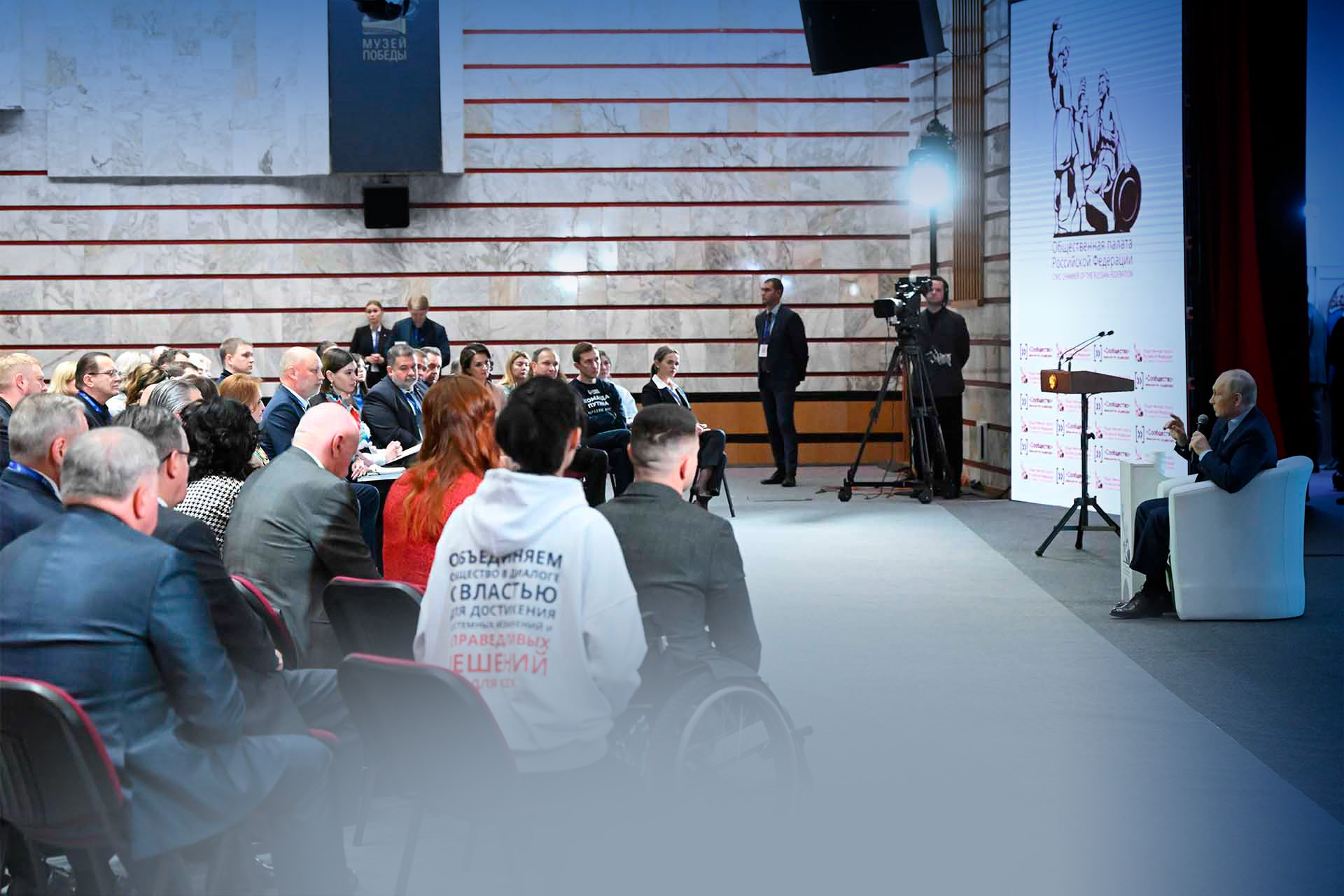
Russian President Vladimir Putin held a meeting with the new members of the Civic Chamber of the Russian Federation at the Victory Museum in Moscow. November 3, 2023. Sergey Guneev / RIA Novosti
A well-developed civil society is an essential component of the democratic process, encouraging citizens to actively participate in the sociopolitical life of the country. The most recognized organizational form of such participation consists of civil society institutions, which provide platforms for expressing opinions, articulating positions, proposing initiatives, protecting interests, and engaging citizens in significant decision-making processes.
In recent years, the qualitative enhancement of dialog between the state and nonprofit organizations has led to a substantial transformation of social institutions. Today, these institutions not only address challenges in various areas of public life but also serve as initiators of social change themselves.
Institutions of civil society as catalysts for social change
Collaboration and cooperation between society and the state
The regular meetings between the President of Russia and representatives of civil society institutions acknowledge the vital role these institutions play in shaping the public agenda and facilitating positive social change. Such meetings not only exemplify the state’s commitment to considering public opinion and engaging with it, but they also provide an invaluable opportunity to convey consolidated public initiatives directly to the head of state.
A tangible outcome of these meetings is the directives issued by the President of Russia regarding pressing issues and the directions of state policy across various areas of public life. These discussions have occurred at the turn of 2023 and 2024, particularly with the Council on Civil Society and Human Rights,6 as well as with participants from the All-Russia People’s Front (APF).7
On November 3, 2023, a meeting was held at the Victory Museum with the eighth composition8 of the Civic Chamber of the Russian Federation as part of the final forum entitled “Community.” During the dialog, the members of the Civic Chamber provided the President of Russia with a comprehensive overview of their ongoing work, presenting initiatives and proposals that had been previously developed in collaboration with the expert community through the public institute’s platform.
As a result of this meeting, on December 23, 2023, the President of Russia approved a List of Instructions.9 The implementation of these presidential instructions has become one of the key focus areas for the Civic Chamber in 2024 and throughout the remaining term of its eighth composition.
Acknowledging the critical importance of demographic development, the Civic Chamber suggested, following a series of regular expert discussions on citizen initiatives in this area, the creation of a new strategic document targeting demographic issues during a meeting with the Head of State. In this context, the President of Russia directed the Government of the Russian Federation, in collaboration with the Civic Chamber of Russia, to prepare and submit proposals for developing a strategic planning document concerning demographic security.
The Civic Chamber of Russia has systematically developed proposals aimed at supporting motherhood, childhood, and families with children, as well as increasing the birth rate over many years. One of the outcomes of this activity was the publication of a Special Report by the Civic Chamber of the Russian Federation titled “Demography 2030: How to Ensure Sustainable Population Growth in the Russian Federation.”10 In this report, based on the analysis of several scenarios, the authors establish the only scenario that ensures sustainable demographic development for the Russian Federation, where an increase in the birth rate guarantees population reproduction.
In response to the President’s directive and with the aim of further enhancing demographic policy management, the Civic Chamber highlighted the need for a Demographic Development Strategy for the Russian Federation extending until 2035. This strategy includes measures to raise the birth rate to achieve a total fertility rate (TFR)11 of 2.1 by 2030.
A key feature of the proposed Strategy is the transition from goal-oriented management to value-oriented management, rooted in traditional family values recognized by all cultures and major religions. These values include fostering a strong family foundation based on marriage between a man and a woman, nurturing multiple children as essential for generational continuity, caring for children from conception, honoring parents, respecting elders within the family, and maintaining ancestral memory and generational continuity.
In alignment with the provisions of the National Security Strategy of the Russian Federation, the Civic Chamber proposed to expand the list of threats to national security by introducing the concept of “demographic security.” This concept should encompass a criterion for demographic security established as the lower threshold of the total fertility rate, set at 2.1.12
Proposals from the Civic Chamber of Russia for the development of a strategic planning document in the field of demographic security
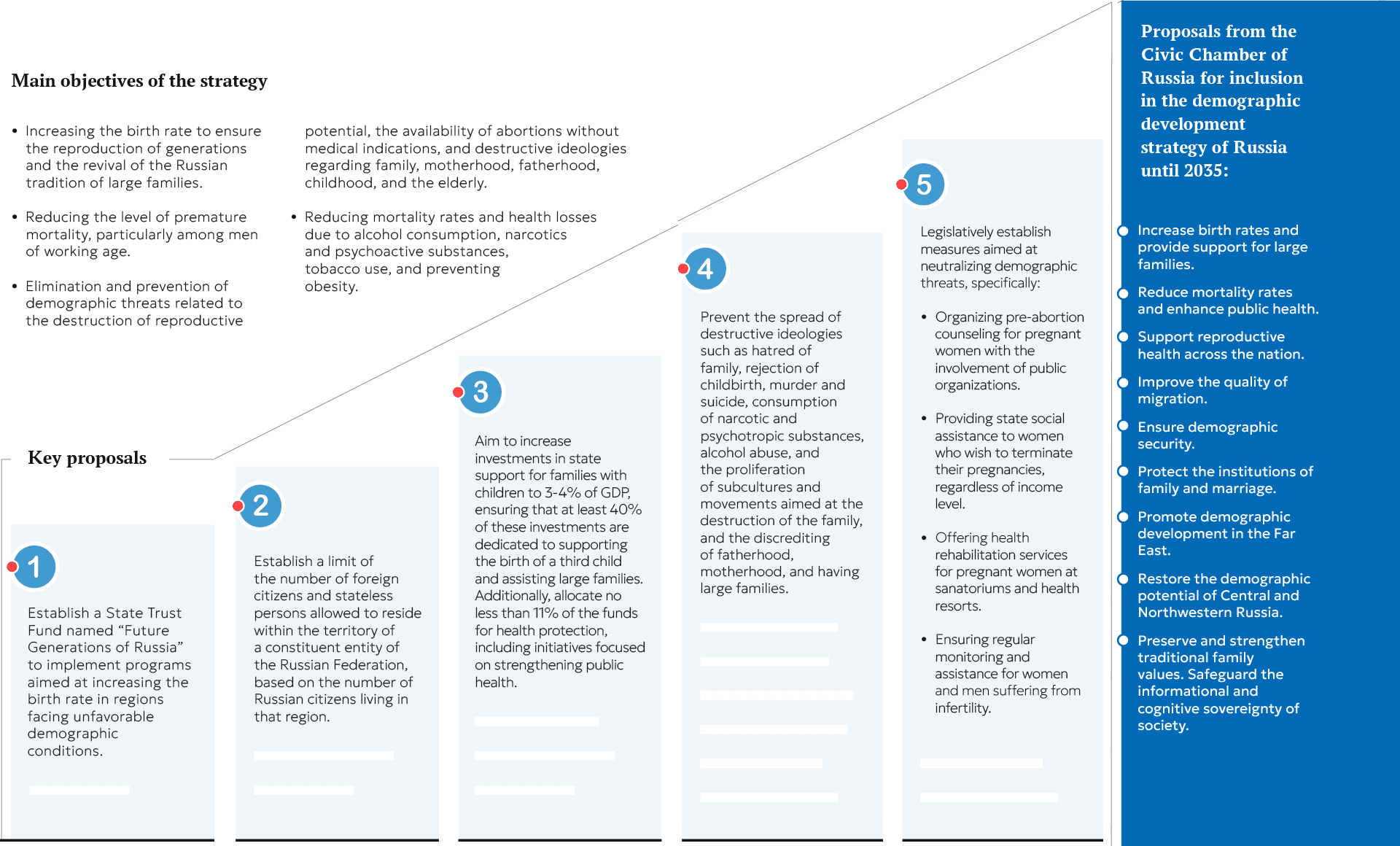
A special report, along with proposals for developing a strategy to improve the demographic situation, has been submitted to the Administration of the President of the Russian Federation concerning the formation and activities of the State Council of the Russian Federation, the Government of Russia, and the Ministry of Labor of Russia. The report proposed several measures to increase birth rates and reduce mortality rates, which have garnered support from the President of Russia during public meetings. These measures include increasing the mortgage repayment subsidy for the birth of a third or subsequent child from 450,000 rubles to 1 million rubles in the Chukotka Autonomous Okrug and regions of the Far East with low birth rates; exempting large families in the Far East from property tax on housing; and raising the standard deduction for children in the calculation of personal income tax (PIT), among others.
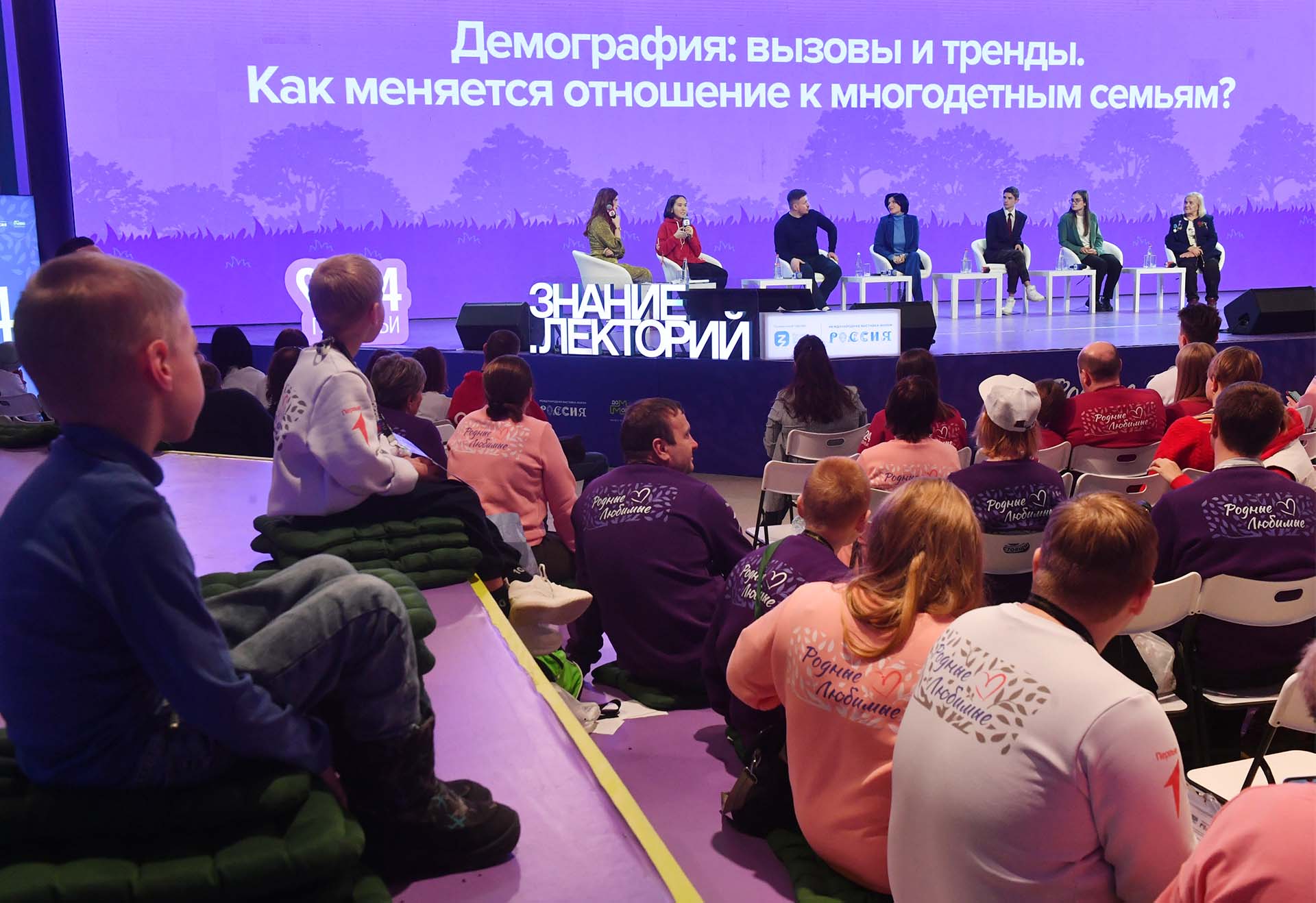
“Russia” Exhibition: A meeting with the most famous large-family mother in Russia, Tatyana Sorokina. January 20, 2024. Mikhail Voskresensky / RIA Novosti Photo Agency
During a meeting with members of the Civic Chamber, significant attention was paid to the development of creative industries in the country. Public representatives emphasized the importance of this sector and requested the President to support the priority consideration of a bill regulating creative industries.
This initiative was reflected in the President of Russia’s directives. The State Duma, in collaboration with the Civic Chamber and representatives from the professional community, has been tasked with refining the federal bill “On the Development of Creative Industries in the Russian Federation” and ensuring it is treated as a priority.
In January 2024, a public examination of this draft federal law took place at the Civic Chamber, during which the members supported the adoption of the bill and prepared a conclusion evaluating the bill and providing recommendations for its improvement.13 On July 30, 2024, Federal Law No. 330-FZ “On the Development of Creative Industries in the Russian Federation” was adopted by the State Duma of the Russian Federation in its third reading, and on August 8, 2024, it was signed by the President of the Russian Federation. The Civic Chamber’s proposals, specifically the inclusion of public relations activities in the creative industries’ scope, have been acknowledged by the State Duma and integrated into the final edition of the Law.
Another initiative endorsed by the President of Russia in this field was the proposition to expand and establish development centers for creative industries in the new regions of the Russian Federation.
The President tasked the Government of the Russian Federation to collaborate with the executive bodies of the Donetsk People’s Republic and the Civic Chamber of the Russian Federation to draft and submit proposals for the establishment of a creative cluster in Donetsk. This cluster would encompass a development center for creative industries, a film studio, and educational institutions such as a school and college for creative industries.
These proposals were crafted by the executive authorities of the DPR with contributions from members of the Civic Chamber of Russia. In forming the creative cluster, it was suggested to combine existing creative industry zones with new facilities to foster multifunctional creative spaces, and to establish the Creative Industries Center in Donetsk as a coordinating hub for the organizations within the cluster. The Concept for a Creative Cluster in the DPR emphasized that developing the creative economy could serve as an effective new approach to rehabilitating the economy of the Donetsk People’s Republic.
To systematically develop the cluster, experts have proposed the establishment of a platform for interdepartmental communication—a council chaired by the Head of the entity, comprising representatives from relevant departments, members of the professional community, and experts. Furthermore, the Civic Chamber has emphasized the necessity for the Government of the Donetsk People’s Republic to allocate a dedicated facility. This space would accommodate a production center for creative industries, a new media school, a branch of the Presidential Fund for Cultural Initiatives, and a regional residence for the National Open Championship of Creative Competencies, ArtMasters. Collaborative efforts among all stakeholders in this initiative are currently underway.
Creative cluster in the Donetsk People’s Republic
Structure of the center for creative industries in Donetsk:
-
Public spaces
-
Music studio and label
-
Center for applied urban studies
-
Offices for small and medium enterprises
-
Content creation studios
-
Publishing house
-
Film company office
Measures for the development of the creative cluster
-
Develop collaborations between creative colleges in the DPR and Russian federal competency enhancement programs for the 2024/2025 academic year
-
Launch new creative faculties in universities of the DPR
-
Create a Film Production Center in Shakhtyorsk
-
Establish a School of Creative Industries under the Ministry of Culture of Russia
-
Introduce updated educational programs in universities and colleges.
The President of Russia has endorsed the proposal from civic groups to engage representatives from the creative industries in the transformation of school environments as part of the expansion of the “School of Dreams” project. This project was initiated by the Civic Chamber of Russia in support of the federal presidential program for the comprehensive renovation of schools, “Modernization of School Education Systems,” within the state program “Development of Education.”
This initiative provides creative youth with a unique opportunity to rethink the educational spaces of Russian schools, many of which were constructed over 30–40 years ago, transforming them into modern, comfortable, and ergonomic environments that align with contemporary demands and the needs of current students and educators. It empowers all stakeholders in the educational process to become co-creators of these changes.
In 2024, the “School of Dreams” nationwide participatory design marathon was initiated in alignment with the specified directives.
In the fall of 2024, creative teams comprising future architects and designers from the Lugansk and Donetsk People’s Republics joined the “School of Dreams” marathon.14, 14.1
Results of the “School of Dreams” participatory design marathon15
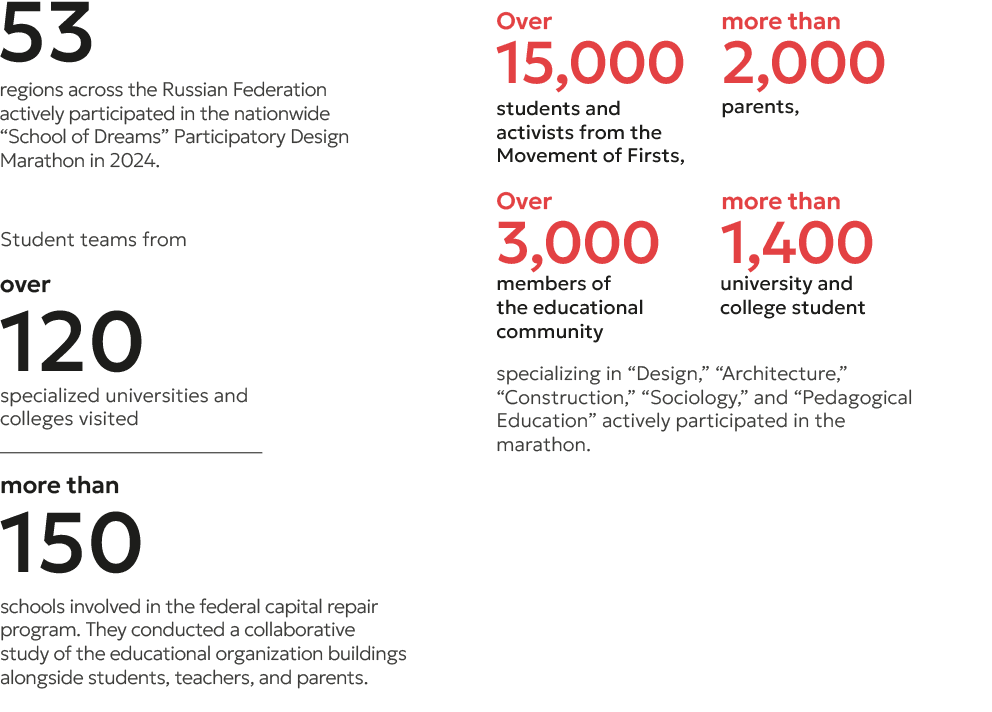
Another crucial educational initiative backed by the President of Russia is the federal project “I Am a Citizen of Russia.” This project aims to provide educational materials to children entering general education organizations and to individuals receiving a Russian Federation passport for the first time. These materials are designed to acquaint them with essential historical, geographical, cultural, and other scientific facts about Russia. Under this initiative, the Russian Ministry of Education and the Civic Chamber of the Russian Federation were tasked with developing proposals for the federal project’s implementation.
Top 5 sections for inclusion in the educational publication “I am a citizen of Russia” for first graders*
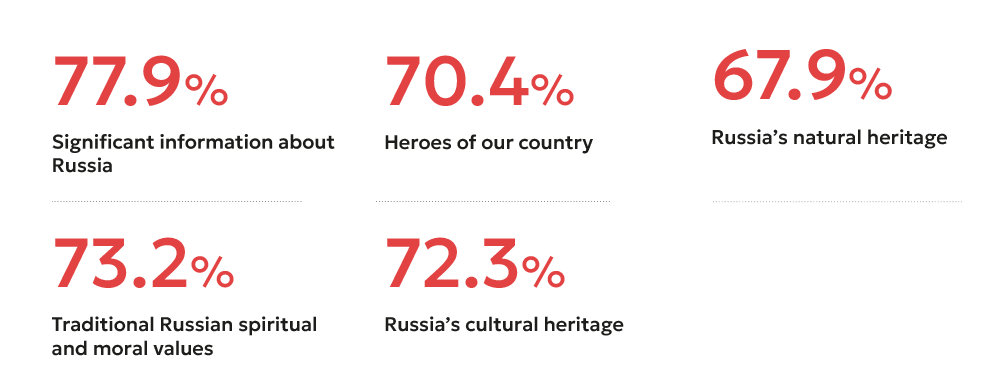
In a series of meetings between activists and ministry representatives, a comprehensive structure for these educational materials was formulated. To incorporate public opinion on this matter, the Civic Chamber of the Russian Federation conducted a nationwide survey regarding citizens’ attitudes toward the structure and content of the educational materials being developed. Based on the analysis of the survey results, the Ministry of Education approved the project for publishing collections of educational materials titled “I Am a Citizen of Russia.” Currently, the Civic Chamber and the Ministry of Education of Russia continue consultations on the substantive content of the educational publications.
For several years, the Civic Chamber of the Russian Federation has consistently advocated for launching a new program to attract and retain specialists in the cultural sector in small towns and villages, where a third of the country’s population resides. A meeting between members of the Civic Chamber and the President of Russia marked a significant breakthrough in this matter: the President of Russia supported the request for the prompt launch of the “Rural Cultural Worker” program and the allocation of necessary funds for its implementation.
14 billion rubles will be allocated for the “Rural Cultural Worker” program from 2025 to 2030.
The program aims to provide employment for approximately 10,000 specialists in cultural institutions in rural areas and small towns.
It is expected to reduce the staffing deficit by over 60%.
On February 29, 2024, the President of Russia announced the launch of the “Rural Cultural Worker” program during the Address to the Federal Assembly. The program is modeled after the successful “Rural Teacher” and “Rural Doctor” initiatives: cultural specialists who move to work in villages or small towns will receive a one-time payment of 1 million rubles. In the Far East, Donbass, and Novorossiya, the payment will be doubled to 2 million rubles. The program is set to begin in early 2025.
After the recent meeting, the proposal to involve the Civic Chamber of the Russian Federation in the revision and enhancement of traffic regulations was taken into account. Immediately following the meeting, the President invited the Civic Chamber representative for a discussion with the Minister of Internal Affairs, Vladimir Kolokoltsev. This led to a directive from the President of Russia instructing the government, alongside the Civic Chamber, to develop and present recommendations for improving the nation’s primary traffic regulations document.
The Civic Chamber had previously highlighted that frequent amendments to existing traffic rules have made them complex for both new and seasoned drivers. Many provisions are currently ineffective, as their phrasing fails to facilitate enforcement and accountability for violations.
The presidential directive has escalated this initiative to a higher level. Taking into consideration public demands and expert advice, the Civic Chamber prepared a document in 2024 proposing enhancements to traffic regulations through the creation of a new document.
Key topics at the meeting with the President included accelerating the integration and development of new regions within the Russian Federation.
The President of the Russian Federation supported the proposal by public figures to create an effective mechanism for a system of public control, accounting, and monitoring of the situation in the regions. In the list of relevant instructions,16 the necessity was noted for conducting comprehensive public monitoring in the Donetsk People’s Republic, the Lugansk People’s Republic, Zaporozhye region, and Kherson region of the compliance by state authorities and local government bodies with the social rights of citizens during the integration of these entities of the Russian Federation into the economic, financial, credit, and legal systems of the Russian Federation, as well as into the system of state authorities of the Russian Federation. The execution of this directive in the Civic Chamber is carried out by the Coordination Council for the integration of new subjects of the Russian Federation, which includes both members of the Civic Chamber and leaders of public opinion in the new regions of Russia,17 with the participation of commissions and other working bodies of the Civic Chamber.
As a result of the year-long monitoring, the Civic Chamber notes the coordinated and active work on the integration of the new regions of Russia into the economic, financial, credit, and legal systems of the Russian Federation. However, the monitoring results also identify issues that require increased attention.
To prevent the violation of citizens’ rights, the Civic Chamber, within the framework of fulfilling the directives of the Head of State, has submitted proposals for legislative adjustments. Monitoring the compliance with the social rights of citizens in the new regions of the Russian Federation continues.
Another initiative supported by the President of Russia, which will be implemented shortly, is the proposal to establish a museum in Mariupol dedicated to the city’s native, the well-known Soviet party and state leader Andrey Alexandrovich Zhdanov, who led Leningrad during the blockade; Mariupol bore his name until 1989.
In March 2024, a joint meeting of the governments of the twin cities St. Petersburg and Mariupol was held in St. Petersburg, where the results of the work on the restoration of Mariupol during 2022–2023 were summarized. During the meeting, an agreement was reached to open a branch of the Museum of the Defense and Blockade of Leningrad in Mariupol, with a separate hall dedicated to A. A. Zhdanov.
Consolidated efforts of public institutions to support Special Military Operation veterans
In contemporary Russia, providing social support for participants and veterans of the special military operation and their families ranks among the primary priorities of national social policy. This critical focus has led to the adoption of comprehensive legislation designed to create a unified and targeted system of assistance for service members, veterans, and their families.
More than 100 regulatory legal acts have been adopted to support military personnel performing combat missions in the special military operation zone.18
Through a presidential decree, the State Support Fund for Participants of the Special Military Operation, named “Defenders of the Fatherland,” was formed to ensure a dignified standard of living and active involvement in society for those engaged in the operation and their families. The Fund’s initiatives span crucial sectors, offering essential social, medical, psychological, and legal assistance.
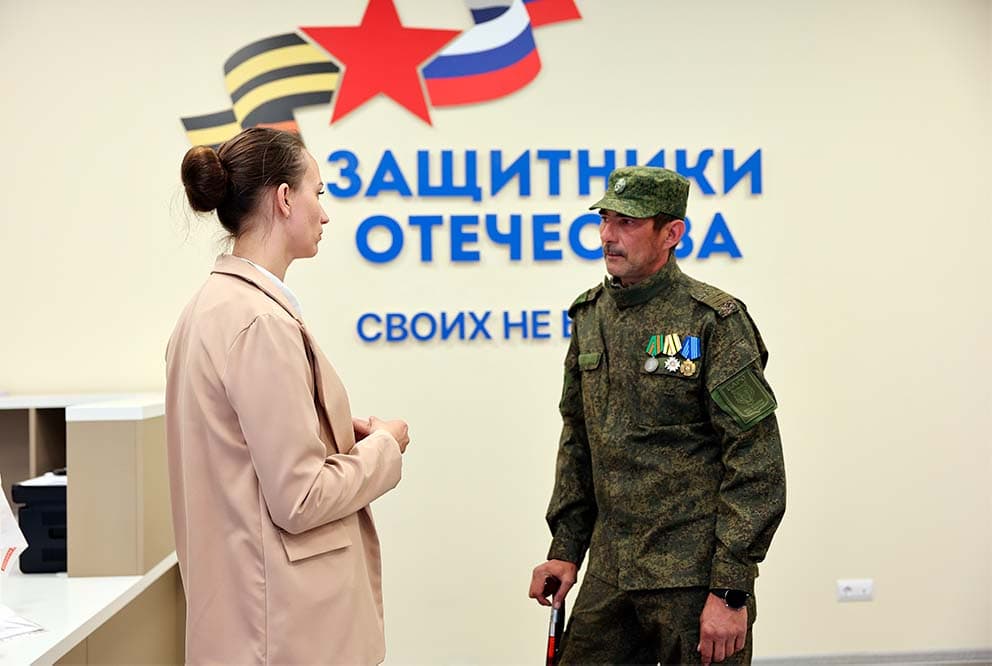
A veteran at the opening of the “Defenders of the Fatherland” support fund branch for participants of the special military operation in Kaliningrad on May 31, 2023. Photo by Vitaly Nevar / RIA Novosti
Emphasis is placed on providing necessary medical rehabilitation and professional retraining, which expedite the reintegration of individuals who have undergone significant trials back into civilian life.
In 2024, a robust engagement of public institutions continues, fostering collaboration towards humanitarian projects and advancing societal initiatives that establish a resilient network of support for operation participants and their families. The Civic Chamber of Russia remains steadfast in prioritizing this field of work.
Throughout the past year, the Civic Chamber hosted thematic events that involved stakeholders from all levels of public authorities, relevant NPOs, professional associations, expert circles, and business communities.
These gatherings aimed to share effective practices, address current challenges, and explore viable resolutions. Among these discussions were notable regional “Community” forums in Irkutsk, Kaluga, and Magas, where experts deliberated on retraining programs, adaptive support, and medico-psychological assistance for participants and their families. Additionally, they examined ways of cultivating societal respect for participants through media, filmmaking, and cultural channels, as well as best practices in providing social, humanitarian, and legal help.
A growing demand currently exists among operation participants and their families for high-quality legal assistance. This demand includes a need for guidance regarding their legal rights and the mechanisms available for claiming entitled benefits and preferences.
In 2024, the Civic Chamber, in strategic partnership with the ANO “Committee of Families of Warriors of the Fatherland,” has greatly expanded the “Legal Assistance to Participants of the special military operation and Their Families” project. Over the course of the year, this initiative has addressed numerous requests that go beyond mere consultation; it includes document preparation, engagement with authorities, and representation in legal proceedings. Key issues addressed pertain to military service details, discharge processes, financial entitlements, military medical assessments, compensations for injuries, social benefits, as well as soldier recovery and exchange efforts.
As part of the activities of the social project “Pravomobil” by the Civic Chamber of Russia, members of the chamber, along with lawyers and government representatives, organize on-site legal citizen appeals offices for participants of the special military operation and their families. These offices provide assistance on a variety of legal issues. In some cases, members of the Civic Chamber also offer direct support to residents of border regions facing challenging situations, such as arranging accommodation in temporary housing centers, transporting seriously ill elderly people to hospitals, and distributing humanitarian aid.
Another joint project by the Civic Chamber of Russia and the nonprofit organization “Committee of Families of Warriors of the Fatherland” is the establishment of a hotline. This hotline is staffed by volunteer lawyers who offer free legal assistance to SMO veterans, their families, and residents of regions bordering the special military operation zone.
In 2024, the joint hotline of the Civic Chamber of the Russian Federation and the Coordination Headquarters for Volunteer Activities received and processed over 9,000 inquiries from citizens, providing assistance on 8,968 issues. There are currently 70 cases in court proceedings across the country, with 37 court decisions made in favor of the applicants*.
Reducing social tensions among special military operation veterans and their families relies heavily on the unification of the professional legal community, its engagement in supporting these individuals, and the advanced legal knowledge and qualifications of the lawyers involved in providing legal assistance.
To foster the development of skills and knowledge among practicing lawyers in offering legal aid to SMO veterans and their families, a practical seminar and conference for legal community representatives was held in October 2024. This event was organized by the Civic Chamber in partnership with the “Committee of Families of Warriors of the Fatherland,” an autonomous nonprofit organization.
The Russian notariat, a vital public institution within the free legal aid system of the Russian Federation, plays a proactive role in supporting participants in the special military operation and their families.
In the first half of 2024 alone, notaries provided more than 124,000 free consultations to SMO veterans and their families as part of the state’s free legal aid program. Furthermore, regional notarial chambers contributed over 1,700 consultations through nongovernmental centers and legal clinics.
In addition to offering free legal assistance, the notarial community initiated a series of programs providing extra benefits tailored to SMO veterans and their relatives, alongside charitable projects supporting soldiers in combat zones.
Furthermore, the Russian notariat is active in the “Legal Support for the SMO” project by the Russian Lawyers Association. This initiative allows SMO veterans, their families, and residents of border territories to receive free legal advice through in-person meetings with notaries and other association members, as well as through hotline calls and chatbot conversations.
The comprehensive experience of providing free legal assistance to SMO veterans and their families—offered by lawyers, notaries, and civil organizations—has been compiled in a Special Report by the Civic Chamber of Russia titled “Development of Free Legal Aid in the Russian Federation under the Conditions of the Special Military Operation,” this report was unveiled to the public at the concluding “Community” forum held in Moscow on November 1, 2024.
In September 2024, the Civic Chamber reviewed and endorsed federal bill No. 667894-8, titled “Amendments to Article 112 of the Federal Law ‘On Enforcement Proceedings’.” This law proposes waiving enforcement fees for military personnel, volunteers, and other participants in the special military operation when enforcement actions are initiated against them.
Beyond legal aid, the Civic Chamber of Russia offers psychological support to the families of SMO veterans. A federal Telegram chat for medico-psychological support, “CFWF. Talk with a Psychologist,” has been active since August 2024, organized jointly with ANO “Committee of Families of Warriors of the Fatherland.”
Since its inception, the Telegram chat has facilitated over 544 instances of psychological assistance concerning various anxiety-related issues for SMO veterans and their families, provided by state medical psychologists.
The tasks of the project, implemented in the format of a medico-psychological support Telegram chat, are not only to provide a unified channel of communication with qualified psychologists but also to involve family members of SMO veterans in various activities aimed at joint leisure and relaxation, promoting family, spiritual, moral, and cultural values, and conducting socially significant public actions with the support of regional headquarters of the ANO “Committee of Families of Warriors of the Fatherland.”
Supported by the Civic Chamber of Russia and the Civic Chamber of the Novosibirsk region, a pilot initiative for a Consulting and Coordination Center for Veterans’ Support has been launched. This center aims to provide free psychological, legal, and informational assistance to veterans, military service-disabled individuals, law enforcement pensioners, and SMO veterans. The goal is to facilitate their social adaptation by offering necessary services seamlessly in a “one-stop” format.
Members of the Civic Chamber and affiliated organizations have consistently engaged in collecting and sending humanitarian aid to the SMO region and to those affected by conflict, including the Kursk region. Throughout 2024, shipments included medical supplies, equipment, clothing, food, household items, machinery, construction materials, and animal feed, aiding both the soldiers and impacted communities.
For the years 2023–2024, the specialists of the Novosibirsk veterans support center accomplished the following work:
-
Direct targeted assistance was provided to 526 service members who sought help.
-
Eight visits to hospitals were organized.
-
Group sessions with family members of SMO veterans are conducted on a regular basis.
-
A training program for advanced qualification, “Psychological Rehabilitation of SMO veterans and Their Families,” was conducted for 90 psychology specialists.
-
A database of employers was created, including more than 600 private and state enterprises.
-
Work is being carried out on career orientation, retraining, and employment of veterans.
Humanitarian aid for the residents of the Kursk region
Since August 2024, the Civic Chamber of Russia has expanded its collection efforts to include additional regions; in addition to Donbass and Novorossiya, border regions are now part of the initiative. People from across the country contribute by bringing medications, clothing, sanitary supplies, and medical equipment to collection points.
As part of the “We do not abandon our own” project,
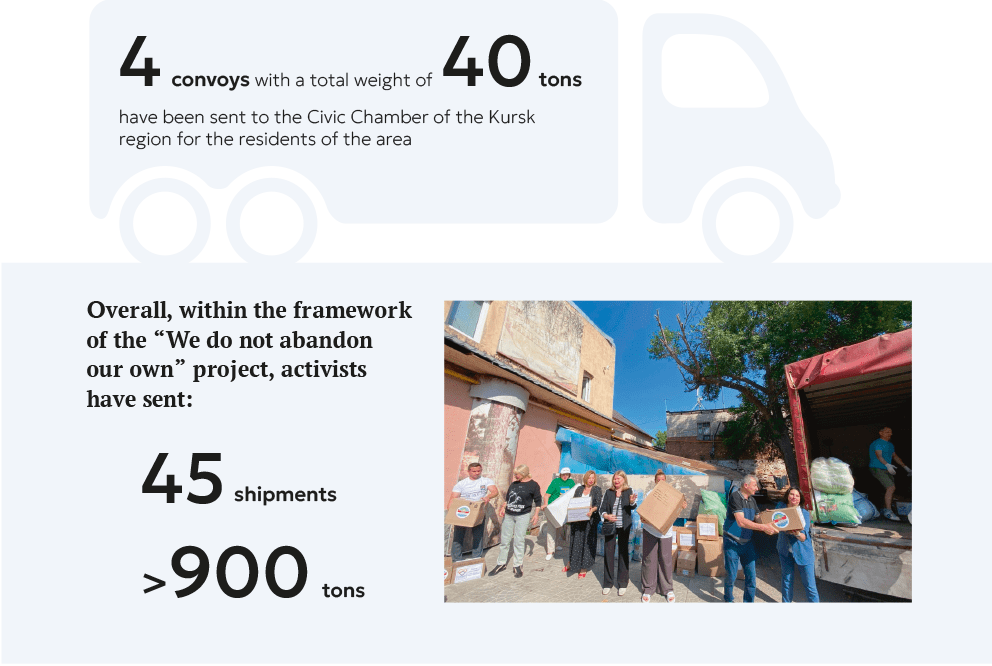
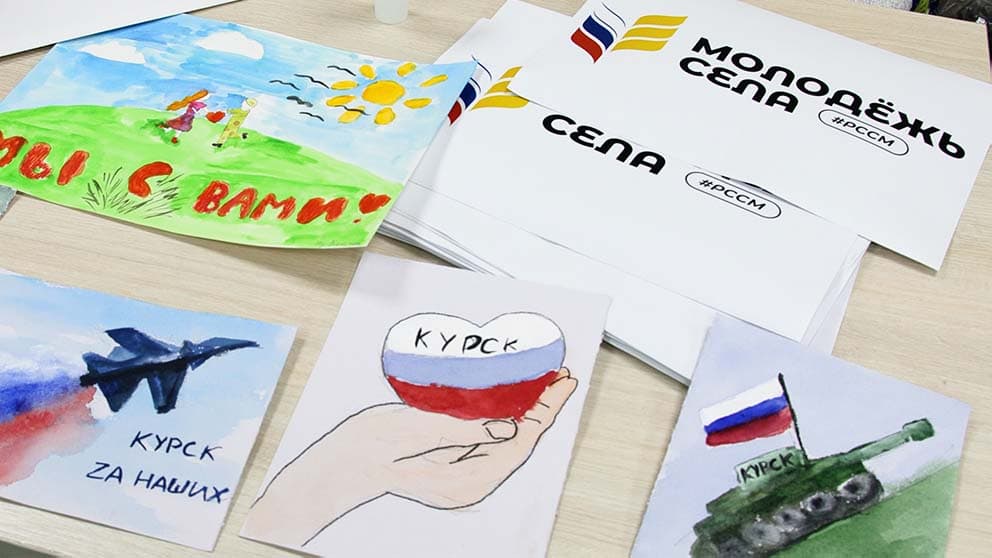
The Russian Union of Rural Youth has also contributed by sending 4 tons of humanitarian aid to regional activists in Kursk, Bryansk, and Belgorod. Along with the cargo, the activists handed over postcards made by children.
The Russian Red Cross has partnered with the Russian marketplace “Wildberries” to deliver aid to the border regions. As part of a joint initiative, public organizations can send goods free of charge to the humanitarian aid warehouse in Kursk.
For example, this opportunity is being utilized by
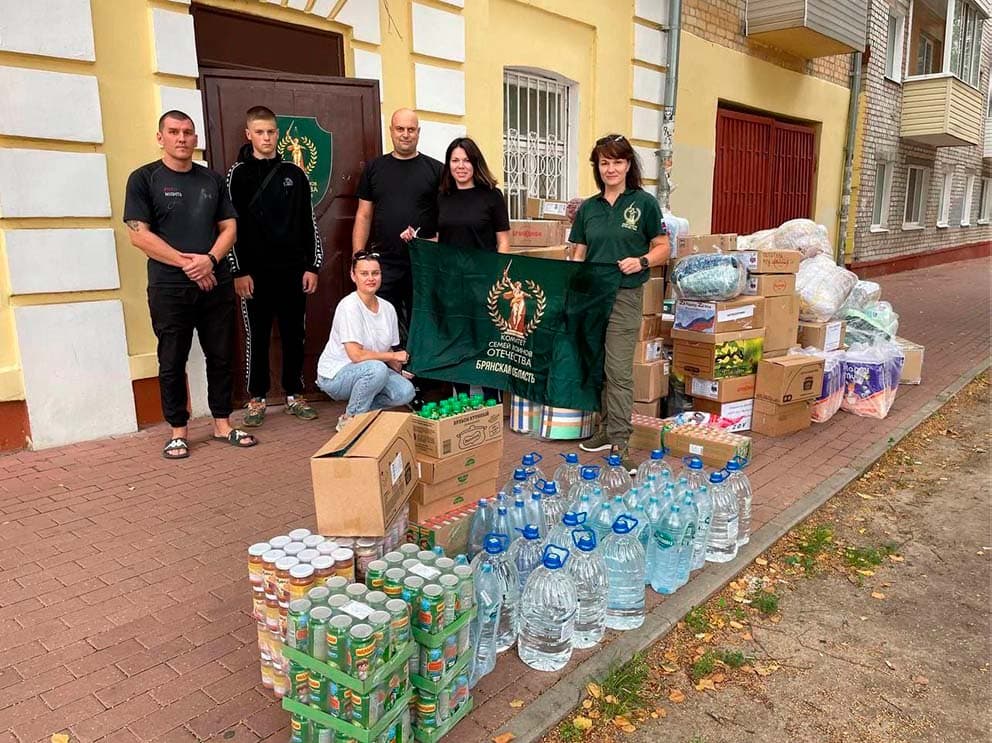
The remaining headquarters send aid using traditional methods—by passenger and cargo vehicles to the organization’s warehouse in Kursk.

The charitable foundation “Blagomed” regularly assists medical institutions in the Kursk region. The Foundation’s team procures medicines, surgical instruments, and medical furniture based on requests from medical and sanitary services.
In early November, the Foundation delivered another humanitarian cargo. It was received by evacuation teams operating in the anti-terrorist operation zone in the Kursk region.


Public participation in achieving national development goals
For several years, in order to fulfill the President of the Russian Federation’s directives,19 the Civic Chamber has been working to support civic initiatives aimed at improving the quality of life for citizens. This area is one of the priorities of the Coordination Council under the Civic Chamber of the Russian Federation for national projects and population retention.
Summarizing the results of 2023, the Civic Chamber sent a corresponding report to the President of the Russian Federation outlining the most significant initiatives that were supported and proposed for consideration in the framework of forming a new system of national development goals until 2036, as well as for economic development.
Taking into account the tasks for ensuring sovereign development set by the President of Russia, the report suggested defining indicators for the growth of the population’s well-being by creating a system for measuring the results of state policy called the “Index of Real Well-Being and Happiness of Citizens.”
As key initiatives, it was also proposed to:
- Identify the reduction of inequality among citizens based on their income as a national goal;
- Develop a national project titled “Preservation, Health Promotion, and Well-Being of Families,” which would include a federal project on “Support and Development of Large Families,” as well as a federal project on “Psychological Health,” which envisions the establishment of a state system for psychological support for citizens.
Additionally, it was noted that it would be advisable to elevate tasks such as the preservation of traditional spiritual and moral values, as well as the development of microelectronics and industrial robotics, to the level of federal projects.
In the context of developing and strengthening the labor market, it was proposed to introduce a social certificate for professional retraining in the Russian Federation, funded by the state budget, which would be effective during the first year after a worker is dismissed from permanent employment. It was also suggested to establish the creation of new jobs, increasing labor productivity, and real wages as key goals of the state investment policy.
At the same time, the advisability of creating a digital system for modern state planning based on a balanced approach and big data was highlighted. This system would ensure optimal solutions for the socioeconomic development of the country, as well as facilitate flexible and variable planning of state activities at all levels of government in real-time.
The Civic Chamber participated in the development of a program for the energy sector in the Far East until 2050, along with the mechanism for its project financing in accordance with the assignment from the Head of State.20
At the recent joint meeting of the Civic Chamber and the State Council Commission on “Energy,” approaches to the development program for the energy sector in the Far East until 2050 were approved. These approaches are based on the outstanding domestic experience of electrification embodied in the plan of the State Commission for Electrification of Russia (GOELRO), particularly:
-
The energy sector of the Far East should develop based on targeted state planning for the accelerated development of the macroregion, utilizing natural productive forces to the maximum extent.
-
When developing the energy system of the Far Eastern Federal District (DFO), long-term prospects for electricity export to countries in the Asia-Pacific region, which is the most dynamically developing region in the world, must be taken into consideration.
-
The development of the energy sector should focus on providing the industry with advanced technologies and skilled personnel.
-
The foundational principles for the industry’s development should include a continuous reduction of costs in electricity production and transmission, along with an increase in labor productivity.
-
To finance the program, it is proposed to use a targeted project emission mechanism that will provide long-term and low-cost funding.
The protocol summarizing the outcomes21 of the meeting was sent to the Government of the Russian Federation, the Administration of the President, the Central Bank of the Russian Federation, the Accounts Chamber, and the relevant ministries and agencies. Following this, the Government instructed22 these ministries to consider the outlined decisions while working on the directive given by the Head of State to develop the energy development program for the Far East until 2050.
In May 2024, the President of Russia outlined the national development goals for the Russian Federation for the period leading up to 2030, with perspectives extending to 2036.23 These goals include:
Preserving the population, enhancing health, improving citizens’ well-being, and supporting families;
Unlocking the potential of each individual, nurturing their talents, and fostering a sense of patriotism and social responsibility;
Ensuring a comfortable and safe living environment;
Promoting ecological well-being;
Establishing a sustainable and dynamic economy;
Achieving technological leadership;
Implementing digital transformation across state and municipal governance, the economy, and the social sphere.
The Civic Chamber of Russia is actively engaged in shaping and adjusting national projects designed to achieve these new national objectives and performance indicators, as well as the tasks set by the President. Several members of the Civic Chamber have been appointed to the relevant public-expert councils associated with the project committees of these new national initiatives.
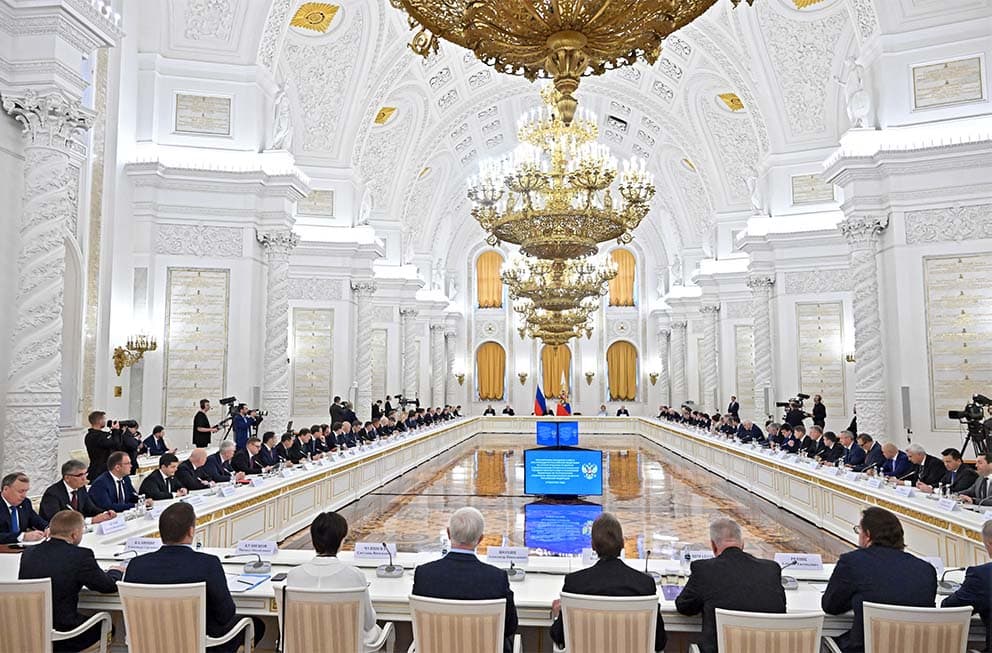
President of the Russian Federation Vladimir Putin held a plenary meeting of the Council for Strategic Development and National Projects and the commissions of the State Council of the Russian Federation. May 29, 2024. Grigory Sysoev / RIA Novosti
Experts from the Civic Chamber emphasize that a fundamental requirement for attaining all national development goals is the establishment of a comprehensive support system for the upbringing, education, and development of children and youth. This system should encompass education, enlightenment, and nurturing, while also creating effective social mobility opportunities for the younger generation of citizens. The national projects “Youth and Children” and “Personnel” specifically target these objectives.
The national project “Youth and Children” encompasses a range of initiatives aimed at ensuring, among other things:
-
The construction of no fewer than 150 new general educational institutions, with an allocation of additional budgetary appropriations from the federal budget, amounting to 210 billion rubles, directed to the constituent entities of the Russian Federation that face a shortfall in spaces within these educational organizations.
-
The extension of the “School Education System Modernization” program until 2030, with an allocation of additional budgetary funds from the federal budget totaling at least 317.5 billion rubles for its implementation.
-
The provision of additional budgetary appropriations from the federal budget, amounting to no less than 100 billion rubles, to finance in-demand cultural, educational, informative, historical, and other creative projects disseminated across cinemas, television, the informational and telecommunication network known as the “Internet,” and social media platforms during the period from 2025 to 2030.
Representatives from four specialized commissions of the Civic Chamber of the Russian Federation have been integrated into the commission of the State Council focused on “Youth and Children.” This national project aims to consolidate various mechanisms of state support and address all topics in young people’s lives, including infrastructure, career development, entrepreneurship, volunteering, science, international youth cooperation, and much more. It will consist of nine federal projects that together will coordinate all measures of support for children and youth, enabling the alignment of the activities of various governmental agencies in the implementation of policies in this sphere, with the involvement of public institutions and volunteer organizations.
In parallel with the development of the national project “Youth and Children,” the Government of the Russian Federation, at the directive of the President of Russia and with the participation of the Civic Chamber and the expert community, has been working on a new foundational document entitled “Strategy for the Implementation of Youth Policy in the Russian Federation for the Period up to 2030.”
The primary objective of the strategic document is to ensure the continuity of generations, the transmission of traditional values inherent to the peoples of Russia, and the knowledge and understanding of the nation’s history. At the core of the strategy are principles aimed at fostering the values of family culture and a healthy lifestyle, as well as promoting youth volunteer initiatives.
For the first time, the document categorizes the youth demographic into specific age groups: 14–17 years, 18–24 years, and 25–35 years, while also reflecting the distinct characteristics and needs of individuals within each of these brackets. Additionally, it takes into account the specificities of various social groups, including rural youth, young scientists, entrepreneurs, youth with disabilities, young people who have served in the military, including in the special military operation zone, and young parents.
On August 17, 2024, the “Strategy for the Implementation of Youth Policy in the Russian Federation for the Period up to 2030” was approved by a resolution of the Government of the Russian Federation.
Key indicators specified in the strategy for implementing youth policy in the Russian Federation for the period until 2030:24
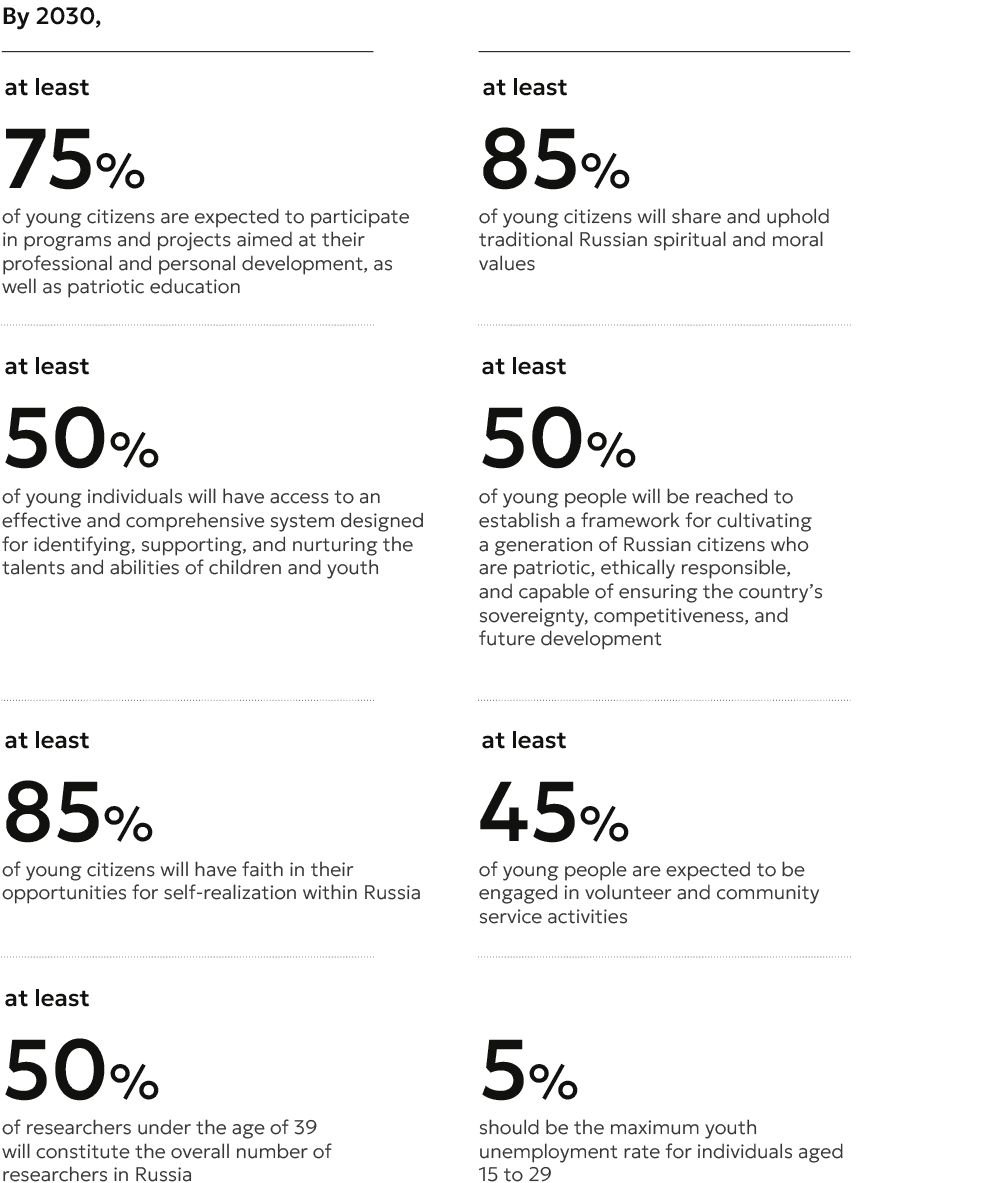
There is ongoing work to enhance the Federal Law “On Youth Policy in the Russian Federation,” particularly in terms of placing greater emphasis on the infrastructure of youth policy, which includes solidifying the priority of patriotic work with youth—a matter of utmost importance in the current geopolitical landscape globally.
An active process of enhancing legislation is also underway in the field of volunteering. The scope of volunteer activities is expanding. The State Duma has adopted a bill in its first reading that equates donors with volunteers and provides them with new support measures. Currently, a draft resolution is under consideration by the Government of the Russian Federation, which will establish uniform health requirements for volunteers entering medical and social institutions based on the type of assistance provided. This initiative aims to eliminate barriers associated with excessive medical documentation requirements for volunteers, thereby making assistance more accessible. Furthermore, discussions are focused on simplifying the mechanism for compensatory payments in cases of health damage to volunteers during their engagement in volunteer activities.
Members of the Civic Chamber of the Russian Federation have played an expert role in the development and discussion of these draft documents. In 2024, expert discussions were conducted within the Civic Chamber, leading to the formulation and submission of recommendations and proposals that have been incorporated into the current revisions of the relevant regulatory legal acts.
Representatives from five specialized commissions of the Civic Chamber of Russia have joined the State Council’s commission on personnel issues. The implementation of the national project “Personnel,” which contributes directly or indirectly to achieving each of the national development goals, aims to synchronize the needs of the economy with personnel training initiatives.
In September 2024, 26.8 million schoolchildren and students commenced their studies across 80,000 educational institutions in Russia. However, a critical shortage of highly qualified personnel is hindering progress in sectors that are priorities for the economy, including high-tech manufacturing, the innovation sector, science, education, and the creative economy.
In 2024, the number of children involved in technical education increased by 37% (over 3.3 million children, with more than 351.3 thousand additional general education programs), while participation in natural sciences education grew by 35% (over 3.2 million children, with more than 466.8 thousand additional general education programs).25
This situation underscores the necessity for not only refining the personnel training process and restructuring the education system but also for establishing a comprehensive development strategy. Such a strategy should encompass a broad range of objectives: from early engagement of children in current issues and the integration of various formats of primary and supplementary education into unified standards of sovereign education, to the development of effective models that motivate and enhance the attractiveness of careers in critical and high-tech industries. The task of developing a long-term strategy for educational development by 2025 was assigned by the Chairman of the Government of the Russian Federation.
It is evident that education cannot be developed in isolation from the economy. To tackle the issue of staffing for national development goals, comprehensive efforts should be undertaken in the following areas:
-
Establish a system for long-term planning and forecasting of workforce needs, while sharing best practices in developing and implementing labor demand forecasts across various economic sectors;
-
Analyze existing practices and create effective mechanisms for collaboration among the government, employers, and educational institutions;
-
Update educational programs to align with labor market demands and integrate modern educational technologies into the learning process;
-
Develop a robust system for early career guidance, particularly focused on engineering and natural sciences;
-
Enhance the attractiveness of productive labor by increasing social safeguards and creating favorable conditions for career advancement and employee development;
-
Foster a supportive environment for employees in the sectors prioritized by the Russian economy, especially in smaller towns;
-
Implement measures to attract and retain highly qualified professionals and talents within enterprises.
that motivate and enhance the attractiveness of careers in critical and high-tech industries. The task of developing a long-term strategy for educational development by 2025 was assigned by the Chairman of the Government of the Russian Federation.
Recently, there has been a substantial overhaul of the strategic planning documents to better specify the priority areas and key science-intensive technologies essential for ensuring the technological and intellectual leadership of the Russian Federation.26 If the quality and effectiveness of the education system align with the goals outlined in these documents by the end of the third decade of the 21st century, Russia will have its own scientific, personnel, and technological foundation for critical and cross-cutting technologies.
To realize the objectives defined in these documents, adequate personnel support is crucial. The development of human capital for establishing an advanced engineering and economic base in various sectors of the country cannot proceed without extensive transformations in the general and supplementary education systems.
Projects from the Physics and Technology School Development Fund, particularly the “Science in Regions” initiative, play a pivotal role in enhancing Russia’s school education system, especially in the areas of science and technology.
The Fund’s technopark—Russia’s largest—offers students unique opportunities for project work and research, featuring
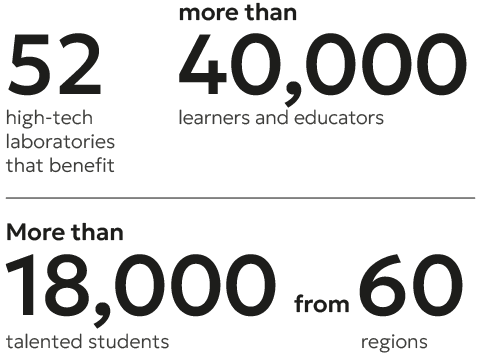
engage in intensive programs and camps focused on in-depth studies of natural sciences under the “Science in Regions” project.
For several years, the Civic Chamber has actively supported a wide array of educational initiatives, ranging from training programs in engineering and tools for fostering the pedagogical community to federal projects for renovating schools, psychological and pedagogical support for students, career guidance for youth, parental education programs, and other significant professional and societal initiatives.
Experts from the Civic Chamber emphasize that all necessary conditions for achieving the objectives specified in the strategic planning documents currently exist within the pre-tertiary education system.
As part of the National Technological Olympiad and the Circle Movement of the National Technology Initiative (NTI),
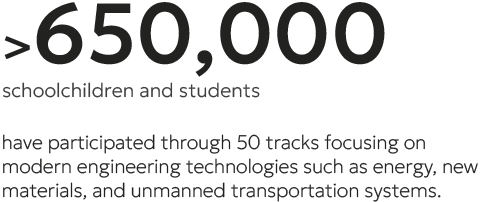
The Circle Movement has gathered information on educational and project-research programs from over 5,000 engineering and technology circles across the country
One of the key indicators for achieving the national development goal of “Sustainable and Dynamic Economy” is the creation of an effective system for training, retraining, and continuing professional development for priority sectors of the economy by 2030, based on projected workforce needs.
Experts from the Civic Chamber consider the establishment of a new national higher education system to be essential in this regard. In line with the Decree of the President of the Russian Federation,27 a pilot project is currently underway that aims to reform the levels of vocational education.
Pilot project aimed at transforming levels of vocational education
In accordance with the Decree of the President of the Russian Federation dated May 12, 2023, No. 343 titled “On Certain Issues of Improving the Higher Education System,” the following levels of education have been established:
-
Basic higher education, with a duration of 4 to 6 years;
-
Specialized higher education (including master’s programs, residency, and assistantship-internship);
-
Postgraduate education (adjuncture) — a distinct level of professional education focused on preparing scientific and academic personnel.
Project overview28
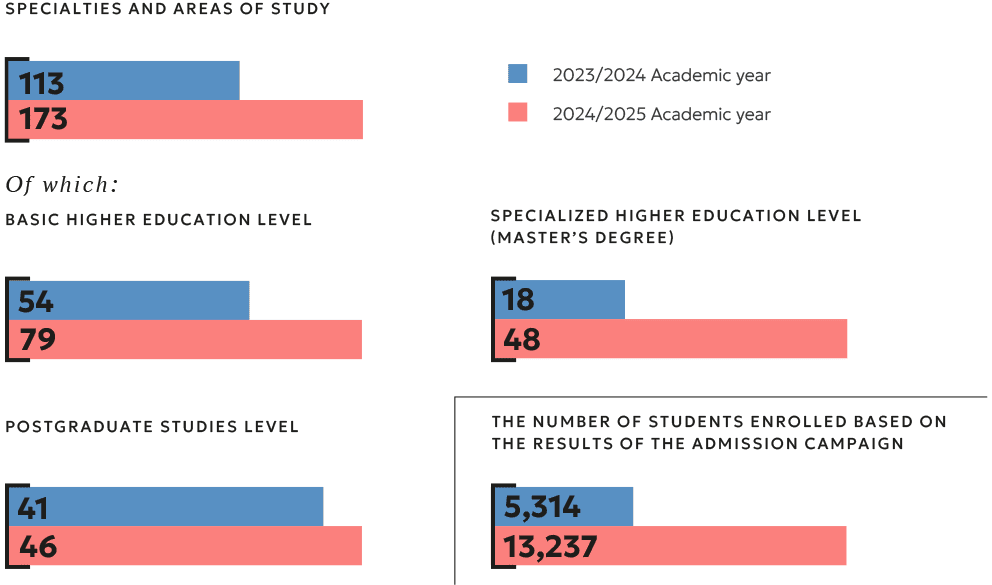
The pilot project involves six leading higher education institutions:
-
Federal State Autonomous Educational Institution of Higher Education “Moscow Aviation Institute (National Research University)”;
-
Federal State Autonomous Educational Institution of Higher Education “National Research Technological University ‘MISIS’”;
-
Federal State Autonomous Educational Institution of Higher Education “Immanuel Kant Baltic Federal University”;
-
Federal State Budgetary Educational Institution of Higher Education “Moscow Pedagogical State University”;
-
Federal State Autonomous Educational Institution of Higher Education “St. Petersburg Mining University of Empress Catherine II”;
-
Federal State Autonomous Educational Institution of Higher Education “National Research Tomsk State University”.
Key changes in educational programs
As a strategic national priority, “Technological Leadership” is now formally recognized for the first time in national objectives as a pathway to achieving technological independence in key areas of Russian science.
In accordance with subparagraphs “a” and “b” of paragraph 9 of the President of Russia’s instruction dated March 30, 2024, No. Pr-616, the development, approval, and implementation of national projects aimed at ensuring technological leadership are currently underway. These initiatives will be launched in critically significant fields, focusing on both research and development, as well as personnel training:
-
“Means of Production and Automation,” “New Materials and Chemistry,” “Industrial Support for Transport Mobility,” and “Unmanned Aerial Systems,” all of which come under the jurisdiction of the Ministry of Industry and Trade of the Russian Federation;
-
“New Health Preservation Technologies” — under the jurisdiction of Ministry of Health of the Russian Federation;
-
“Technological Support for Food Security” — Ministry of Agriculture of the Russian Federation;
-
“New Nuclear and Energy Technologies” — Ministry of Energy of the Russian Federation;
-
“Promising Space Technologies and Services” — State Corporation “Roscosmos.”
A significant number of activities aimed at scientific and technological development and personnel support are included in the national project “Youth and Children.”
The mechanism of national projects for ensuring technological leadership is focused on uniting the efforts of a qualified customer, who ensures guaranteed long-term demand for the produced goods, and the main contractor, who, with the help of cooperative chains, develops critical technologies and organizes the production of the corresponding high-tech products.
Representatives of four relevant commissions of the Civic Chamber of the Russian Federation have joined the commission of the State Council focused on “Sustained and Active Life.” The implementation of a new large-scale national project is aimed at improving the quality of life for Russians and raising the expected lifespan to 78 years by 2030 and to 81 years by 2036.
One of the key areas within achieving the goals of the national project, alongside the development of the healthcare system, is the promotion of the values of physical culture, sports, and a healthy lifestyle. Experts from the Civic Chamber note that in 2024, there has been a significant increase in the number of citizens engaged in sports, highlighting the essential role that public organizations play in this work.
According to the Presidential Grants Foundation, the category “Health Protection of Citizens and Promotion of a Healthy Lifestyle” ranks first in terms of the number of projects submitted for participation in competitions, and second for the number of winning projects.
The budget for the state program “Development of Physical Culture and Sports” amounted to 70.32 billion rubles in 2024.
Over the past year, numerous private charitable foundations have been actively engaged in supporting hundreds of civic organizations and projects related to sports, physical culture, and healthy lifestyles.
In 2024, the Presidential Fund for Cultural Initiatives, in collaboration with the Ministry of Culture of the Russian Federation and the Ministry of Sports of the Russian Federation, launched a large-scale charitable program aimed at providing targeted assistance to cultural and sports institutions in the newly integrated regions of Russia. In addition to this targeted support, the fund also backed projects from civic organizations in the field of sports, totaling 100,091,285.36 rubles.
Throughout 2024, there was significant growth in the development of new sports civic organizations, including associations of sports clubs, leagues of sports societies, specialized public organizations, student sports clubs, and other similar entities, which remain independent from the International Olympic Committee (IOC) and other international sports structures. These sports organizations are forging alliances with analogous bodies in other countries and are themselves conducting international competitions in various formats.
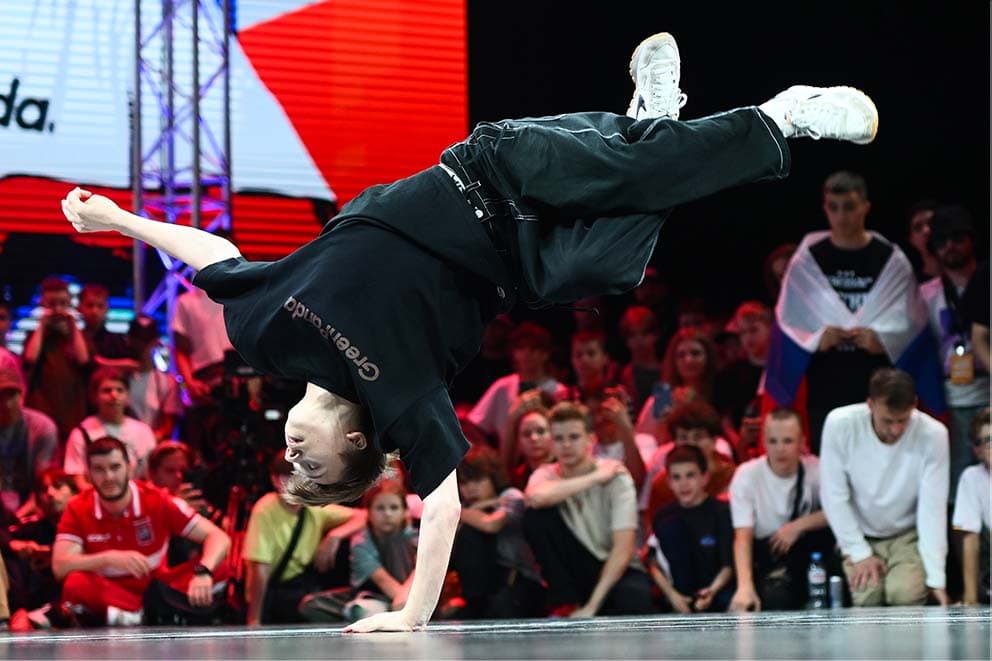
Grom (Russia) during the breaking competitions at the BRICS Games in Moscow. June 23, 2024. Vladimir Astapkovich / RIA Novosti
In recent years, Russia has hosted numerous prominent sporting events, including international ones, in which over 100 countries participated. These events were organized by civic structures, despite the prohibitions imposed by the IOC and the sanctions that followed. Experts from the Civic Chamber of Russia emphasize that the support for organizations that directly unite sports communities and contribute to the nation’s health, provided by the Ministry of Sports of the Russian Federation, is inadequately established and often excessively bureaucratic. This issue persists into 2024.
In 2024, public interest in contemporary sports disciplines—particularly mass or street sports—continued to grow. According to the Ministry of Justice of the Russian Federation, over 800 nonprofit organizations registered in various spheres of street and contemporary sports, marking a 13% increase compared to 2023 and a 47% increase relative to 2022.
The share of participation of public organizations in the areas of mass or street sports in 2024 is over 84%.
The construction of sports facilities within walking distance is one of the most crucial mechanisms for encouraging citizens to engage in systematic physical activity and sports. In Russia, the federal project “Sport is a way of life” plays a significant role in creating comfortable conditions for physical activity. Since its inception in 2019, 199 facilities have been constructed. By the end of the first half of 2024, the level of sports facility coverage in Russia’s regions reached 64.5%. However, an analysis of the inquiries received by the Civic Chamber from athletes and physical culture activists across various regions of Russia indicates that, despite the high official percentage of cities equipped with sports facilities, the actual demand and relevance for such facilities today is far more extensive and diverse.
The Civic Chamber is monitoring the implementation of the instructions from the President of the Russian Federation dated October 7, 2021, No. Pr-1919, and July 20, 2024, No. Pr-1365, regarding the development of youth sports. In this regard, recommendations have been prepared and sent to the Government of Russia to increase to 100% the share of children who have accessible opportunities for engaging in sports that correspond to their lifestyle, to provide opportunities for those with health deviations to pursue educational programs in sports training in abstract-logical sports, and to expedite the approval of the subprogram “Sports in Rural Areas” and the federal project “Local Coach.”
In October 2023, during his speech in Perm at the international forum “Russia – A Sports Power,” the President of Russia set the task of engaging 70% of citizens29 in systematic sports activities by 2030. The Civic Chamber of Russia emphasizes that the public sector retains a leading and key role in achieving this target by promoting the values of physical culture, sports, and a healthy lifestyle, as well as mass and street sports.
Another national project that will directly influence the quality of life for Russians is the national project “Environmental Well-Being.” Representatives of the Civic Chamber have joined the State Council’s commission on “Environmental Well-Being” to monitor the achievement of the national goal of environmental well-being and to track the progress of the corresponding national project, along with other matters related to environmental protection.30
Experts from the Civic Chamber have formulated and submitted proposals to the State Council’s commission on “Environmental Well-Being” for inclusion in the new national project aimed at improving the quality of life for citizens.
The achievement of the national goal of “Environmental Well-Being” will also be supported by the process of public validation of companies’ reports on sustainable development, which received new impetus31 in the Civic Chamber in 2024. The public auditor will be represented by the Coordinating Council under the Civic Chamber for Environmental Well-Being and the Development of Nonfinancial Public Reporting Practices.32 Its members consist of representatives from leading civil society organizations and independent experts.
The ranking partner will be the RAEX agency, which is tasked with the professional evaluation of nonfinancial public reporting based on its own methodology, utilizing specific indicators and criteria.
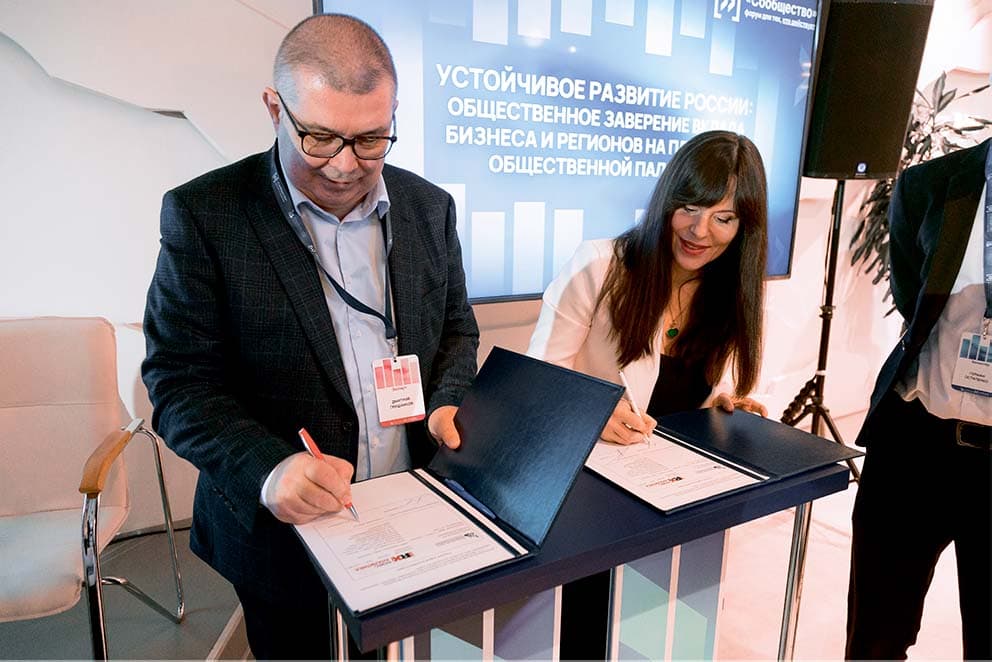
An agreement establishing a ranking partnership was signed between the Civic Chamber of Russia and the ranking agency RAEX at the final forum “Community” held in Moscow. November 1, 2024. Press Service of the Civic Chamber of the Russian Federation.
Currently, ethnocultural, religious, and interethnic organizations, along with other specialized nonprofit entities, are actively collaborating with the government to address a wide range of key issues arising during the implementation of the state national policy. A significant area of focus for civil society organizations during the special military operation is the patriotic upbringing of the younger generation, the preservation of historical memory, and the counteraction to the ideology of neo-Nazism, which is particularly relevant for the new subjects of the Russian Federation.
The priorities of the national policy of the Russian Federation include the strengthening of civic unity and consciousness, the preservation of the distinctiveness of the multinational people of the Russian Federation (the Russian nation), the protection of ethnocultural and linguistic diversity within the country, the prevention of extremism, and the mitigation of conflicts arising on national and religious grounds. Additionally, the promotion of interethnic and interreligious peace and harmony is of utmost importance, especially in regions with high levels of migration and complex ethnic and religious demographics, as well as in the border territories of the Russian Federation.33
All these issues consistently remain at the forefront of the Civic Chamber’s attention, where discussions involving public authorities, civil society organizations, and various scientific, professional, and specialized communities take place. These discussions address existing problems, formulate proposals for their resolution, and evaluate successful practices in the implementation of the national policy of the Russian Federation.
In 2024, the Civic Chamber served as a platform for broad discussions on topics such as the interaction between the government and religious organizations during the special military operation,34 the role of civil society in implementing national policy,35 the reinforcement of ethnocultural sovereignty of the multinational people of Russia,36 the role of traditional religions in bolstering spiritual and moral values,37 enhancing measures against extremism,38 and improving state migration policies.
During discussions at the Civic Chamber regarding the current challenges facing the state and civil society institutions in furthering their collaboration on the implementation of national policy, public experts noted the necessity of activating and stimulating the development of ethnocultural infrastructure, including friendship houses, centers for the national cultures of the peoples of the Russian Federation, ethnoparks, ethnovillages, and other state and municipal organizations whose activities are directed at addressing the objectives of national policy.
In the context of heightened international tensions and increased external pressures on Russia, including through ideological influence and informational confrontation, the need to ensure the ethnocultural sovereignty of the Russian Federation, as well as to protect its traditional spiritual and moral values, is of particular urgency. This involves a comprehensive understanding of the historical experience of cooperation among the peoples of Russia, their joint service to the homeland, the ideological and spiritual foundations of nationwide unity, as well as enriching and developing the prospects for a coherent Russian civic identity.
Among the strategic goals of the state in implementing national policy are measures aimed at countering any manifestations of neo-Nazism, contemporary forms of racism, nationalism, xenophobia, and Russophobia, as well as attempts to distort history for the purpose of fostering confrontation and revanchism in global politics, efforts to revise the outcomes of World War II, and the minimization of the Soviet people’s contributions in the Great Patriotic War of 1941-1945.39 Consequently, an immediate task for the state and society is to engage effectively in the realization of state policy of the Russian Federation pertaining to historical education.40
Currently, issues related to migration policy, the imperfections of the existing system of social and cultural adaptation of foreign citizens in the Russian Federation, and their integration into Russian society have not been fully resolved in the sphere of interethnic and interreligious relations.
The formation of closed ethnic enclaves is a consequence of this situation, which in turn becomes one of the factors contributing to the spread of extremist ideology among migrants.
To address the existing issues in the sphere of interethnic and interreligious relations, proposals were formulated for the authorized state authorities at the Civic Chamber, including the following:
-
Development and approval of requirements, criteria, and content for measures aimed at ensuring the social and cultural adaptation and integration of foreign citizens;
-
Development and improvement of the system of Russian language, history, and culture courses within the network of pre-immigration training centers;
-
Creation of centers to facilitate the adaptation of foreign citizens in regions of the Russian Federation that experience high migration pressure;
-
Establishment of a system for anti-extremist education;
-
Implementation of a mechanism for testing foreign citizens upon their entry into the Russian Federation for temporary employment to identify their adherence to extremist ideology and/or their predisposition (taking into account their worldview and psychoemotional characteristics) towards involvement in extremist activities;
-
Development of additional measures to improve the selection, placement, and training of personnel capable of ensuring the implementation of measures to combat illegal migration and extremism in federal government bodies, regional government bodies of the Russian Federation, and local self-government authorities;
-
Ensuring the participation of civil society institutions in the development and implementation of regional and municipal programs for the prevention of extremism and combating extremism, as well as timely response to the emergence of conflict situations and the factors contributing to them.
2024 — the Year of the Family
On January 23, 2024, during the All-Russian forum “Dear Loved Ones,” Vladimir Putin launched the Year of the Family in Russia. The announcement by the President of Russia declaring 2024 as the Year of the Family marks yet another important step aimed at promoting state policy in the area of family protection and preserving traditional family values.
On the same day, the President of Russia signed Decree No. 63 “On Measures for Social Support of Large Families,” which established a unified status for large families across the country. On February 29, 2024, in his Address to the Federal Assembly of the Russian Federation, the President reiterated the introduction of new measures aimed at supporting large families, emphasizing that a large family should become a norm, a philosophy of society’s life, and a guiding principle for all state strategies.41
Creating conditions for young families to have their first children, strengthening reproductive health, supporting large and multigenerational families, and forming a healthy trend towards large families became key tasks for implementing numerous initiatives that took place in 2024 under the aegis of the Year of the Family in Russia.
Throughout the year, the Civic Chamber of Russia held a series of events focused on developing proposals for regional social support measures for large families. In particular, possible measures for implementing Decree No. 63 in the territorial subjects of the Russian Federation were discussed,42 along with issues related to providing large families with land plots43 and other pressing concerns. As a result of these events, proposals were formulated and sent to the Government of the Russian Federation. These proposals aimed to stimulate regions that decided to introduce all the recommended support measures for large families outlined in Decree No. 63 without considering the criterion of need, as part of a new national project called “Family.” This included the introduction of a co-financing mechanism from the federal budget for specific priority social support measures, along with additional support measures for regions facing unfavorable demographic situations.
From March 2024, the Civic Chamber of Russia launched a new project coinciding with the declared Year of the Family — “The Year of the Family in Parks of Russia.” This project became a communication platform for regions in Russia to create comfortable family leisure opportunities and enhance public spaces and parks.
Among the project’s priorities were the popularization of family leisure and the creation of attraction points in cities not only for parents with children but also for young people and older generations. In addition to promoting family leisure, the project’s implementation also raised the need to develop, in collaboration with state universities, a methodology and educational program for training specialists in improving public spaces and enhancing the quality of urban environments.
The project “Year of the Family in the Parks of Russia” brought together over 2,000 leaders from various sectors.45
Key results achieved during the project’s implementation in 2024 included the identification and unification of industry leaders in more than 50 regions of the country, including those territories currently regarded as the most attractive to tourists—such as the Altai Republic, Karelia, Krasnodar Krai, Vladimir, Volgograd, Yaroslavl, Kostroma regions, and many others.
Addressing demographic issues, preserving and strengthening public health, and increasing life expectancy—these and other matters concerning the improvement of the quality of life for Russians were the focus of discussions among participants at the all-Russian forum “Healthy Cities in the Year of the Family,” held at the Civic Chamber in April 2024.44 The event featured productive discussions that brought together representatives of government authorities, civil society, the professional medical community, and relevant experts.
As part of the activities dedicated to the Year of the Family, the Civic Chamber of Russia actively collaborated with public organizations. An example of this cooperation was the interaction with the All-Russian public organization for family support “Union of Families of Russia.”On April 5, 2024, a congress of a public organization was held at the Civic Chamber of Russia, and on July 8, a large-scale forum titled “Big Family – Big Russia” took place on Family, Love, and Loyalty Day. During the forum, public awards were given to families who have raised their children with dignity, thereby making a significant contribution to the preservation and strengthening of traditional values.
Under the auspices of the Civic Chamber, a poetry competition called “My Big Family” was held in 2024. This competition provided an opportunity for young talents aged 14 to 18 from different regions of Russia to make their voices heard across the country. The works of the winners were published in a special edition presented at the “Community” forum in November 2024.
To develop targeted guidelines and proposals for improving the level and quality of life for families with children until 2030, the Civic Chamber conducted a public discussion in May 2024, which included representatives from relevant nonprofit organizations, the expert community, and government authorities. As part of the event, a study was initiated to prepare a special report by Rosstat and the Civic Chamber of Russia titled “Family and Children in Russia.” The publication of this report was included in the plan of key events by the Government of the Russian Federation for the Year of the Family in Russia. The corresponding report was published in November 2024.
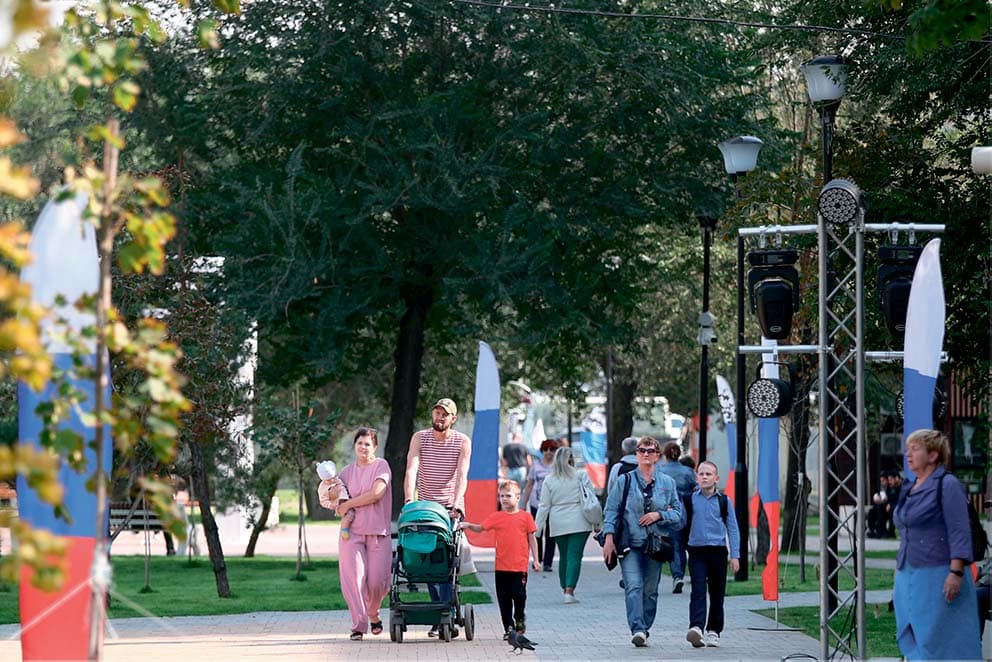
People are walking in a park in Volgograd, which was opened on the Day of the Reunification of the DPR, LPR, Zaporozhye, and Kherson regions with Russia. September 30, 2024. Kirill Braga / RIA Novosti
In July 2024, the Civic Chamber conducted a public examination and supported the federal bill No. 638814-8 “On the annual payment to working parents with two or more children” (regarding the establishment of a family tax benefit).46 According to experts from the Civic Chamber, the introduction of a family tax benefit has become a logical step in the systematic improvement of the tax system, responding to a legislative initiative that is in high demand, and is expected to yield a positive social and demographic effect in the near future. At the same time, the experts noted that the experience gained from implementing previous social initiatives, particularly the provision of a unified allowance, revealed that some families resort to fictitious divorces to meet the established income per capita criteria. Additionally, in certain regions of the Russian Federation where the subsistence minimum is low, some families engage in fictitious registrations in areas with higher living standards. In this context, to prevent dishonest practices and enhance the social and demographic effects, the Civic Chamber proposed to extend the proposed regulation to all categories of families until their per capita income reaches 1.5 times the subsistence minimum, regardless of the number of children in the household.
Furthermore, the Civic Chamber believes it is sensible to allow for the application of reducing coefficients to the 6% income tax rate based on the marital status of the family, the number of children, the presence of dependents, and the number of employed family members. One of the recommendations from the Civic Chamber for further improving the tax system is to explore the possibility of establishing a family tax benefit for young families during their first three years of marriage, amounting to no less than 3% of the income tax paid.
In light of the successful implementation of the new national project, “Sustainable and Active Life,” which builds on the Presidential Decree of the Russian Federation “On the National Goals for the Development of the Russian Federation for the Period up to 2030 and for the Perspective up to 2036,” the project outlines targets to increase life expectancy to 78 years by 2030 and to 81 years by 2036. During the “Community” forums47, the Civic Chamber showcased successful community projects dedicated to promoting active longevity, such as the “Navigator of Community Health” and “Grandchildren’s Studies.”
Nonprofit organizations: a means for partnership between the state and society
Over the years, the nonprofit sector in the Russian Federation has undergone significant positive transformations. Becoming more influential and professional, it has substantially expanded its areas of activity, allowing it to play an increasingly significant role in shaping state policy.
Nonprofit organizations not only provide considerable support to various groups in need and tackle the most pressing and complex social issues; they also offer innovative solutions that are increasingly coming to the attention of the state. Whereas in the past nonprofit organizations primarily funded their projects through contributions and donations, today, in light of the growing contribution of nonprofit organizations to the public sector, the government provides substantial support to the nonprofit sector in the form of grants and subsidies.
Thanks to government support, both the scale and number of socially significant projects are increasing annually, along with the professionalization of nonprofit organizations. The level of development of nonprofit organizations has become one of the key indicators of the overall development of civil society, reflecting the maturity of civic initiatives and their role in the implementation of social policy.
In 2024, the charitable foundation for the rescue of severely ill children, “Line of Life,” fully ensured the implementation of the CAR-T cell therapy project at the N. N. Blokhin National Medical Research Center of Oncology. The application of CAR-T cell therapy is expected to significantly increase rates of recovery and remission in the treatment of pediatric oncological and oncohematological diseases.48
Each year, the number of nonprofit organizations (NPOs) that have become providers of budgetary services in the social sphere continues to grow. Positive dynamics in this area are demonstrated by certain subjects of the Russian Federation, such as Leningrad Oblast, the Republic of Bashkortostan, and the Khanty-Mansi Autonomous Okrug — Ugra. This is evidenced by the data from the Ministry of Economic Development of Russia’s ranking for the year 2023.
A significant role in the emergence of new social services transferred to nongovernmental providers on a competitive basis is played by social ordering. The Civic Chamber has noted the positive results arising from the implementation of new social ordering mechanisms, which allow NPOs to develop as service providers in the social sphere. During the trial period of the Federal Law “On the State (Municipal) Social Order for the Provision of State (Municipal) Services in the Social Sphere,” the number of nongovernmental service providers increased by 8.47 times—from 55 nongovernmental organizations in 2021 to 466 in 2023.
The trial demonstrated that the social ordering tools are in demand and effective. Significant qualitative changes and positive effects, including an increase in consumer satisfaction, have been observed across all sectors of the social sphere that participated in the trial of the new mechanism (social services, employment, palliative medical care, sanatorium and resort treatment, sports training, and tourism).
Throughout 2024, the Civic Chamber has systematically engaged in activities aimed at supporting NPOs. Proposals have been developed and submitted to the Ministry of Finance of the Russian Federation regarding amendments to Federal Law No. 402-FZ of December 6, 2011, “On Accounting.”
The Civic Chamber has supported a number of legislative initiatives aimed at improving the legal framework for nonprofit organizations (NPOs), including the following:
-
The federal bill “On Amendments to the Federal Law ‘On the State (Municipal) Social Order for the Provision of State (Municipal) Services in the Social Sphere’” and Article 34.1 of the Federal Law “On Physical Culture and Sports in the Russian Federation.”49 This initiative is intended to extend the implementation of the Federal Law dated July 13, 2020 No. 189-FZ “On the State (Municipal) Social Order for the Provision of State (Municipal) Services in the Social Sphere” from January 1, 2025, across the entire territory of the Russian Federation. Over its years of piloting, the law has proven effective, particularly in increasing the engagement of nongovernmental service providers in social orders and enhancing citizen satisfaction with the quality of services rendered.
-
The federal bill “On Amendments to Article 73 of the Federal Law ‘On State Control (Supervision) and Municipal Control in the Russian Federation’” is aimed at reducing the duration of various inspections of NPOs.50
-
The federal bill No. 653556-8 “On Amendments to Article 31.1 of the Federal Law ‘On Nonprofit Organizations’” aims to include activities related to family support, motherhood, fatherhood, and childhood, as well as the organization and conduct of events designed to promote the development of child placement forms defined by Russian legislation for children left without parental care. It also covers the care of animals in shelters, participation in the prevention of juvenile neglect and offenses, the development of intermunicipal cooperation, and the improvement of public spaces in the list of socially oriented activities.51
-
The federal bill “On Amendments to Article 31.1 of the Federal Law ‘On Nonprofit Organizations’” concerning the granting of preemptive rights to socially oriented nonprofit organizations (SONPOs) to enter into lease agreements for a new term with landlords at preferential rental rates regarding specific state and municipal properties, provided there is continuous use of such properties under lease.52
These proposed changes aim to allow nonprofit organizations (NPOs) that are subject to mandatory auditing to apply simplified accounting methods, which will facilitate the further enhancement of legislation concerning NPOs and the development of charitable organizations and the nonprofit sector as a whole.53
The federal bill No. 502104-8 “On Amendments to the Code of the Russian Federation on Administrative Offenses,” which aims to increase liability for violations of personal data processing regulations54, has elicited mixed and contradictory reactions from experts of the Civic Chamber. The Civic Chamber expressed concerns that the proposed administrative fines for legal entities for failure to notify or for untimely notification of the authorized body are excessively high and disproportionate to the consequences of the offenses for small businesses and NPOs. According to the experts of the Civic Chamber, the adoption of this bill in its current form poses a risk of halting socially significant activities of NPOs and small businesses, as well as an increase in court proceedings related to potential bankruptcies of organizations. The Civic Chamber concluded that the reviewed bill requires significant revision.
According to a report on nongovernmental organizations published by the Ministry of Economic Development of Russia in October 2024, in 2023, 85 subjects of the Russian Federation implemented a phased approach to ensuring access for nongovernmental service providers in the social sphere to budgetary funds. This work is being carried out by the regions across five main areas: social protection and social services, education, culture, health care, and physical culture and sports. Additionally, more than half of the regions implemented supporting measures in areas such as youth policy and the provision of intersectoral services, which include organizing recreational activities for children and youth, offering services for sociocultural events, engaging in publishing activities, providing legal assistance, and more.
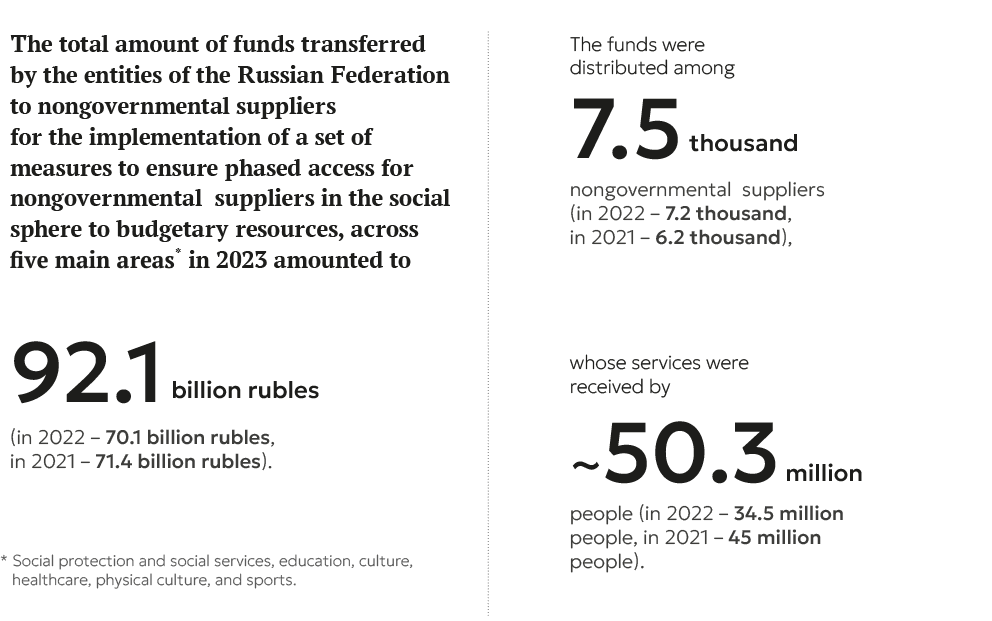
The volume of funds from the budgets of the territorial entities of the Russian Federation in 2023, allocated to nongovernmental suppliers for the provision of services in the following sectors:55
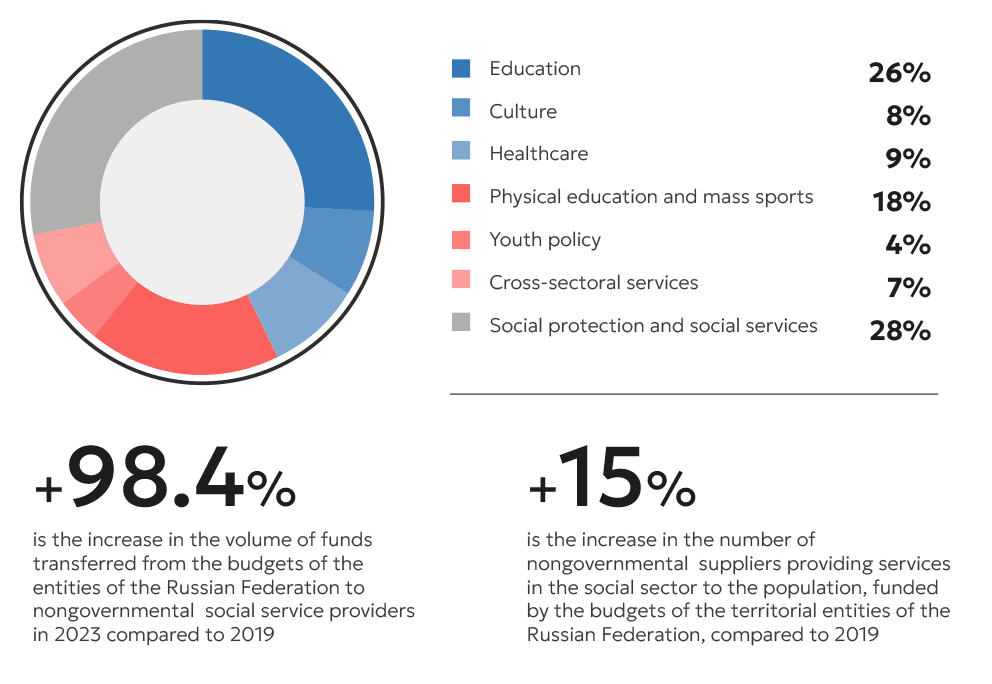
Currently, there are certain challenges in determining the actual number of active socially oriented nonprofit organizations (SONPO) in the Russian Federation. According to the Federal State Statistics Service, there are 130,000 SONPOs operating in Russia. However, the Presidential Grants Foundation and the RAEX ranking agency report different figures regarding the number of SONPOs. To develop a unified methodological approach to collecting and analyzing data on socially-oriented NPOs, various methodologies for accounting NPOs and SONPOs were discussed in 2024 at the Civic Chamber of Russia. Participants included representatives from the Ministry of Justice, the Ministry of Economic Development of Russia, Rosstat, and the Center for Civil Society and Nonprofit Sector Research of HSE University. Experts from the Civic Chamber emphasized the importance of transitioning to digital forms of NPO reporting, including to obtain reliable statistics on the number of active SONPOs in Russia.56
Among the key areas of activity for Russian SONPOs, significant progress has been made in developing a long-term care system in the Russian Federation. In the Presidential Decree on May 7, 2024, “On the National Development Goals of the Russian Federation for the Period up to 2030 and the Prospect until 2036,” the President of Russia emphasized the need to improve the accessibility of this system for citizens most in need of help.57
Since 2011, the charitable foundation “Joy in Old Age” has been providing comprehensive psychological, informational-consultative, financial, medical-social, and domestic assistance to elderly people and people with disabilities in difficult life situations. Currently, the Fund’s activities cover 70 regions, providing assistance to more than 700 institutions, including nursing homes, psychoneurological institutions, nursing care departments, and home service branches of comprehensive social service centers. On a regular basis, the Fund implements direct assistance programs for individuals: purchasing firewood and coal, covering the cost of food packages, organizing treatment for pressure sores, paying for medical nutrition, delivering medical beds, care products, rehabilitation equipment, paying for caregivers, eye surgeries, dental prosthetics, and much more. Volunteer assistance has been one of the most important directions of the Fund’s work since its inception.
The Fund has provided methodological support in developing a Standard Model for a Long-term Care System for elderly citizens and people with disabilities in need of care, the implementation of which is carried out under the federal project “Senior Generation” of the national project “Demography.” From September 1, 2023, the developed model has been implemented across the entire territory of the Russian Federation.58
In 2024, state authorities of the territorial subjects of the Russian Federation actively joined in the implementation of the Standard Model for the Long-term Care System59, ensuring its introduction in the regions60 and involving both governmental and nongovernmental nonprofit organizations as providers of social services within the long-term care system.
In 2024, 171,000 Russians have already been included in the long-term care system.
> 500,000 people, by order of the President of Russia, will be connected to the system by 2030.61
An important area of joint work between the state and public institutions is providing assistance to homeless citizens and their rehabilitation.
As part of the implementation of Instruction Pr-64(5)62 of the List of Instructions composed following the meeting of the Council under the President of the Russian Federation on the Development of Civil Society and Human Right on December 4, 2023, the Civic Chamber held a roundtable on February 27, 2024, titled “Presentation and Discussion of Tyumen Region’s Experience in Assisting the Homeless,”63 resulting in effective recommendations for state and regional authorities. In particular, the assistance system for the homeless created in the Tyumen region has been recommended for study and replication in other regions.
In 2024, the system of supported living gained new momentum for development, functioning as a genuine alternative to psychoneurological institutions. The implementation of such a system will enable citizens with mental differences to live in a regular apartment, with support provided by specially trained social workers. Socially oriented NPOs will be extensively involved in the implementation of this model. On July 3, 2024, the Government of the Russian Federation approved regulations for organizing supported living for people with disabilities. According to experts from the Civic Chamber, establishing a unified state procedure for organizing this activity will improve the quality and accessibility of social support services and enhance opportunities for the socialization of people with disabilities.
In 2024, efforts to develop the third sector continued in the new territorial subjects of the Russian Federation. The number of registered NPOs is increasing, as is the number of NPOs participating in and winning grant competitions. Educational events on the development of socially oriented NPOs are being organized for employees of nonprofit organizations, civil activists, and government and municipal officials. In 2024, around 200 representatives from regional and local government bodies in the new regions of the Russian Federation became acquainted with the work of resource centers supporting NPOs in the Lugansk People’s Republic, the Donetsk People’s Republic, and the Zaporozhye region through participation in an advanced training program titled “Modern Technologies of Public-State Interaction,” organized by the Institute of Public Administration and Civil Service of RANEPA.64
Following the training, proposals were developed for enhancing interaction between socially oriented NPOs and business organizations in the new regions, expanding informational support and media presence for NPOs in these areas, and further developing NPOs within the municipalities of the Lugansk People’s Republic, the Donetsk People’s Republic, and the Zaporozhye region.
Interaction of the institution of commissioners in the Russian Federation with civil society
The establishment of the institution of independent ombudspersons (commissioners), acting as state human rights defenders in the Russian Federation, is the result of years of improving human rights protection mechanisms at both federal and regional levels. A long-term development trend of the ombudsperson institution is the expansion of its functions and specialization, primarily based on the vulnerability of certain population categories and groups of citizens in our country.
Currently, in the Russian Federation, there are several types of commissioners covering significant problematic areas of public life and ensuring the implementation of one of the most important directions of public oversight—monitoring how the state fulfills its obligations in the sphere of human rights and freedoms. The oldest and fundamental institution in the system of independent state human rights protection is the Commissioner for Human Rights of the Russian Federation, established by the 1993 Constitution of the Russian Federation.
Tasked with resolving conflicts between state and individual interests and balancing the “power dynamics” between the state and society in the area of rights and freedoms, the institution of the Commissioner for Human Rights has undergone a challenging period of establishment and consolidation. Over the years, a legislative and legal framework has been developed for the participation of Russian ombudspersons in extensive and meticulous work on respecting and protecting human rights and freedoms within Russia and beyond. The institution of state human rights protection has been established in all territorial subjects of the Russian Federation, with the last region to adopt the law on the human rights commissioner being the Zaporozhye region in March 2024.65
In the past three years, the institution of human rights commissioners has faced new important tasks stemming from a complex environment related to sanctions pressure, the conduct of a special military operation, and the necessity of legal support for participants of the special military operation and their families, as well as residents affected by military actions in regions bordering Ukraine.
On the international front, the Commissioner for Human Rights is actively involved in difficult negotiation processes concerning the exchange of Russian military personnel who have been captured during military operation.
One of the significant areas of activity for the human rights ombudsman institutions is collaboration with civil society institutions. Continuous interaction occurs with a broad range of public structures, including the institution of civic chambers, the Council under the President of the Russian Federation for the development of civil society and human rights, public supervisory commissions, charitable foundations, human rights-oriented organizations, and volunteer movements. Commissioners consider and incorporate into their work the ideas and initiatives of civil society activists, as well as information on current human rights cases, providing direct support to public institutions when necessary.
An example of such activity is the ongoing joint work of the Civic Chamber of Russia and the Commissioner for Human Rights in the Russian Federation on appeals from participants in the special military operation and their families. The result of this cooperation included the discovery and release from captivity of a wounded Russian Army serviceman, whose mother had filed an appeal with the Civic Chamber in mid-2024.
Beyond citizen appeals, there is active cooperation between the Commissioner for Human Rights in the Russian Federation and the Civic Chamber of Russia in several other areas. One of the largest projects is the citizen observation of voting processes. The Commissioner for Human Rights in the Russian Federation, Tatiana Moskalkova, is not only an invited expert to the Monitoring Center of the Civic Chamber of Russia for election observation but also conducts monitoring of citizen observation processes and and the protection of citizens’ rights.
The first specialized ombudsperson institution in the Russian Federation was the Commissioner for Children’s Rights under the President of Russia, a position established by a presidential decree in 2009.66 Prior to this, over 11 years, a new mechanism was designed and tested in five pilot regions of the Russian Federation,67 leading to the introduction of the position of the Commissioner for Children’s Rights.
The adoption of Federal Law No. 501-FZ “On the Commissioners for Children’s Rights in the Russian Federation,” dated December 27, 2018, initiated by the President of Russia, marked a significant new phase in developing the children’s rights institution. The federal law enabled a standardized approach to the activities of regional commissioners. Furthermore, the Commissioner under the President of Russia for Children’s Rights was endowed with the authority to coordinate the activities of commissioners in the constituent entities of the Russian Federation, aiming to implement a unified state policy in the protection of the rights and legitimate interests of children, ensuring effective human rights work.
Today, the development of the institution continues actively, and its activities are being progressively organized in the new regions of the Russian Federation: the Donetsk and Lugansk People’s Republics, Zaporozhye and Kherson regions.
Commissioners and advisers to the heads of regions on children’s rights operate in 89 regions of the Russian Federation.
In recent years, the priority areas for the Children’s Rights Commissioner have remained humanitarian issues and the safety of children and families with children, especially in regions affected by military actions.
At the end of 2023, the President of Russia supported Maria Lvova-Belova’s proposal for a one-time payment to children injured as a result of Ukrainian aggression and issued the corresponding decree.68 By mid-2024, 241 children received the one-time payment, with the majority—128 children—being from the Donetsk People’s Republic.69
Commissioners for Children’s Rights in the regions are involved in providing assistance to families and children residing in temporary accommodation centers. The institution of commissioners for children’s rights offers medical, psychological, legal, material, and educational assistance as needed and upon requests from citizens living in these centers.
Targeted aid to children and children’s institutions is also provided in territories directly affected by military actions. Ongoing targeted assistance continues for families and children’s institutions within the humanitarian initiative “Into the Hands of Children,” organized in early April 2022 by the Commissioner in collaboration with the Autonomous Noncommercial Organization “Russian Humanitarian Mission” and other partners. Currently, five humanitarian centers are operational (in Donetsk, Mariupol, Lugansk, Melitopol, and Genichesk), from which humanitarian aid is specifically delivered to families with children, needy minors, and children’s institutions, including those in conflict zones.
An important direction in the work of the children’s rights commissioners is organizing recreation for children from both new regions of the Russian Federation and those near the frontline. Separate efforts are dedicated to aiding the rehabilitation of children with disabilities and severe illnesses.
In 2023 and the first half of 2024, 246 children received medical rehabilitation and health resort treatment through the office of the Commissioner for Children’s Rights.
In addition to rehabilitation assistance, under the support of the Commissioner for Children’s Rights under the President of Russia, the development of children’s infrastructure for those requiring special care is advancing in the new regions of the Russian Federation. For instance, in December 2023, a day care center for children with disabilities opened in Lugansk. In June 2024, the Regional Center for Psychological, Pedagogical, Medical, and Social Assistance (Melitopol, Zaporozhye region) became one of 15 winners of the All-Russian grant competition “Centers of New Opportunities.” The center was allocated up to 2 million rubles to create a new comfortable space for children with disabilities.70
To prepare personnel for working with children affected by military actions, the Commissioner is implementing additional education programs for those directly involved in working with children.
The Commissioner places special emphasis on finding guardianship and foster care for unsupervised children who have been left without parental care. This form of child protection is considered the preferred arrangement, taking into account the potential reunification of minors with their biological relatives, if found, and in accordance with the Convention on the Rights of the Child.
With the Commissioner’s involvement and by the order of the President of Russia, efforts continue to reunite children with parents who were separated from their families due to military conflict. This work is supported not only by Russian but also by international partners, including the International Committee of the Red Cross and the State of Qatar, among others.
Through the direct involvement of the Commissioner’s office, 70 children from 52 families have been reunited with their relatives living in Ukraine and other countries.71
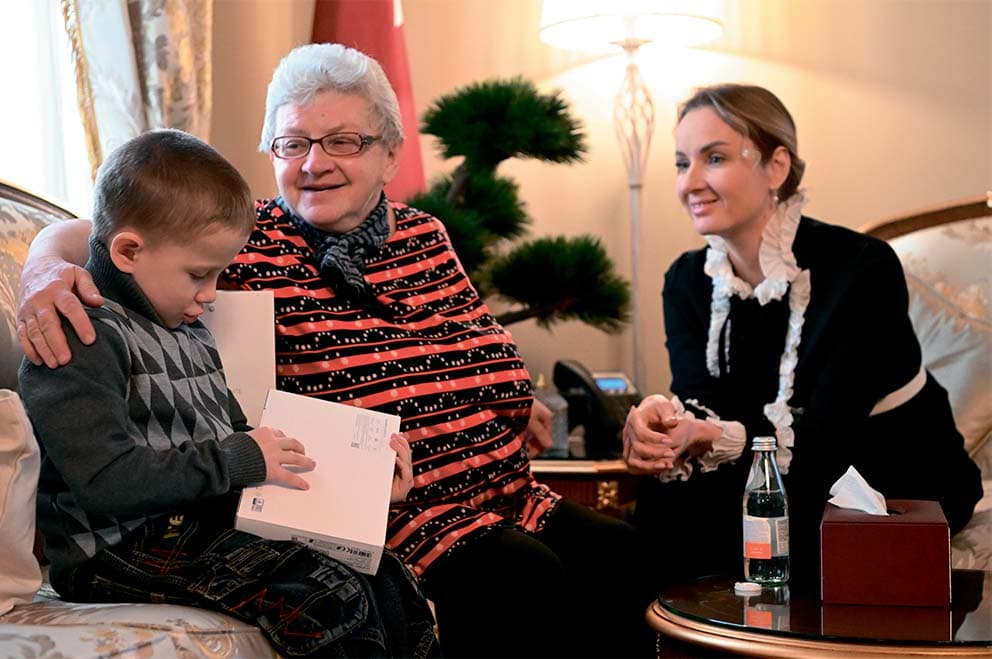
The Commissioner for Children’s Rights under the President of the Russian Federation, Maria Lvova-Belova (on the right), at a meeting of children from new Russian regions with their relatives from Ukraine at the Qatar Embassy in Russia, March 21, 2024. Kristina Kormilitsyna / RIA Novosti
An important step in the development of the institution of specialized ombudsmen was the establishment of a separate ombudsman position focused on protecting the rights of entrepreneurs. A directive for this was issued by the President of Russia in one of the May decrees of 2012, No. 596, “On Long-term State Economic Policy.”72
On October 11, 2012, the President of Russia, at a meeting addressing the protection of entrepreneurs’ rights, noted that the new ombudsman’s office should be formed under the Civic Chamber of Russia. Thus, entrepreneurial activity, which not only contributes to economic growth and the implementation of innovations but also ensures social stability and the development of civic activity in the country, was officially recognized as an important component of civil society.
Over the years, the business protection institute, comprising a central office and regional representatives, has received tens of thousands of appeals from entrepreneurs regarding a wide range of issues and problems—ranging from minor administrative violations to unlawful criminal prosecution. Many of those who appealed have received tangible help and support as a result of their petitions being reviewed.
The most important factors for the successful operation of the business ombudsman institute include the consolidation of thousands of public assistants around it and a well-established mechanism for cooperation with business associations across the country and government agencies. This allows the business protection institute to effectively formulate solutions to identified issues and annually present relevant proposals to the President of the Russian Federation.73
Social partnership in addressing public challenges
Today, social investment, carried out through development institutions represented in our country by independent expert nonprofit organizations, has become a new, powerful, and flexible financial tool for the state in developing civil society. The practices of state social investment fundamentally transform traditional views on solving major social issues, integrating ideas of social impact with classical investment approaches to implement large-scale positive social changes and to preserve and enhance human capital.
The ideas of supporting civil society by the state through one of its key productive forces—nonprofit organizations—have been actively discussed by the public in Russia since the early 2000s. In July 2005, at a meeting of the Council under the President of the Russian Federation on the Development of Civil Society and Human Rights, the President of Russia supported the idea proposed by the expert community to create budgetary funds that would provide grant funding to Russian nonprofit organizations. This system of grant support for nonprofit organizations74 was established in 2006.
For the first time, the Presidential Grants competition took place in 2006. A total of 1,054 nonprofit organizations received funding amounting to 472.7 million rubles.
Initially, the operator for the presidential grant contest was the Civic Chamber of the Russian Federation, which was later replaced by several grant operators. Significant changes in the grant distribution process occurred in 2017. On April 3rd, the President of Russia signed a decree to improve the grant system for NPOs75 and issued an order transferring the administration of these functions to a single grant operator.76 From that time, the Presidential Grants Foundation (PGF) became the sole operator of state support for nongovernmental nonprofit organizations in the Russian Federation.
Over the years, the Presidential Grants Foundation has become the largest development institution in the social sphere in Russia. Today, the Foundation organizes contests across 11 key socially significant areas, each reflecting the most in-demand public initiatives. Expert evaluation of projects is conducted based on transparent and comprehensible rules and procedures.
With each passing year, the scale of the Foundation’s activities is expanding. In 2024, following two rounds of contests, the Foundation supported 2,916 socially significant projects with a total sum of 7.8 billion rubles and allocated 2 billion rubles to 80 regions of the country for co-financing their own contests for nonprofit organizations.
Since 2019, the Presidential Grants Foundation has conducted independent assessments of the outcomes of the supported projects. Independent evaluation helps the Foundation and nonprofit organizations understand the social impact achieved through project implementation and determine which initiatives were the most successful.
In 2024, for the first time in the history of state support for NPOs, the Foundation provided the general public with the opportunity to access project reports on its website and express their own opinions on the outcomes of each one.77 Positive evaluations of project results by the public will enhance their chances of receiving a presidential grant in future contests.
Presidential grants foundation
Results of the First Presidential Grants competition of 202478
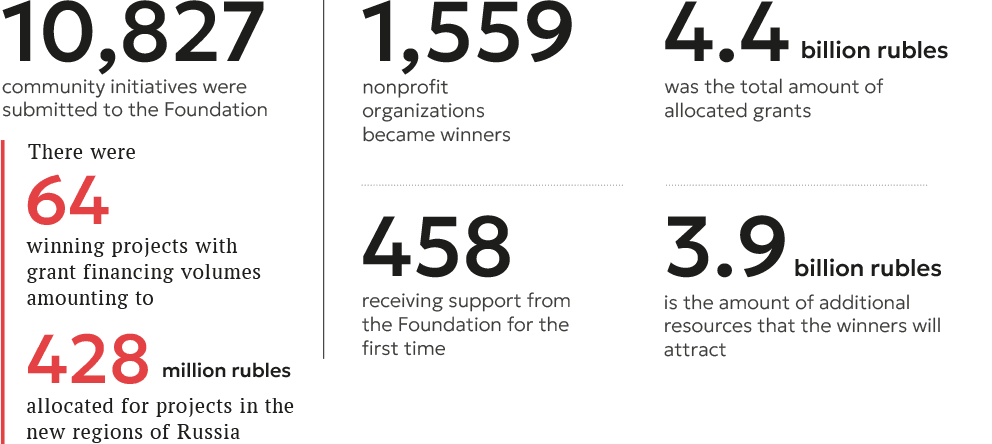
Results of the Second Presidential Grants competition of 202479
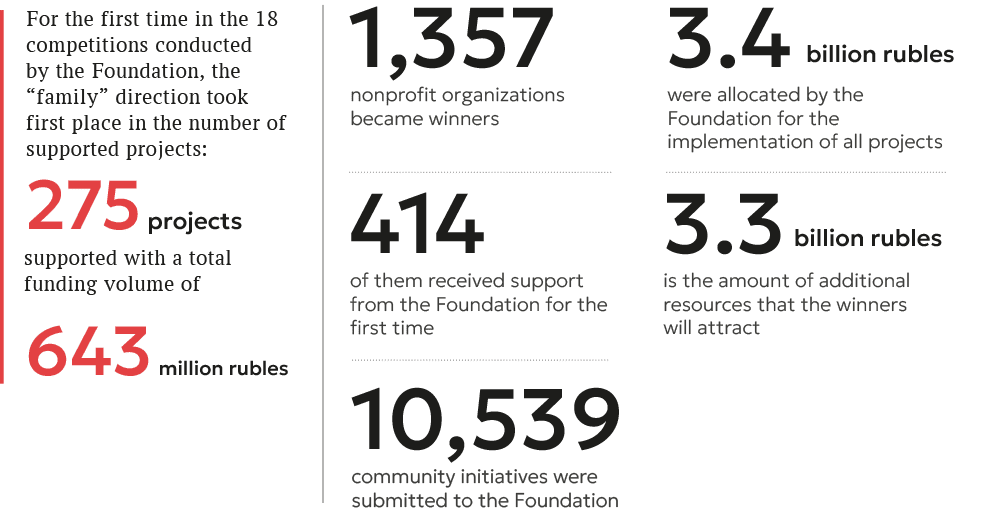
80.7% of the initiatives supported by the Foundation from 2017–2022 were deemed successfully implemented, 15.7% were satisfactory implemented, and 3.6% were unsatisfactory.
500 projects were identified as the best (100 projects for each annual evaluation cycle from 2019–2023). 80
37% of the current funding for Russian NPOs* comes from the Presidential Grants Foundation.81 Previously, in 2013, the level of state support for the nonprofit sector was estimated at 5%.**82
On April 21, 2021, during the Address to the Federal Assembly, the President of Russia announced an initiative to establish the Presidential Fund for Cultural Initiatives83 to support projects in the fields of culture, arts, and creativity. The Presidential Grants Foundation became the sole founder of this new fund.84
Since its inception, the Presidential Fund for Cultural Initiatives has become the largest state fund encompassing all major areas of development for the creative industries in the country. The Fund provides comprehensive support on a competitive basis to nonprofit organizations in the implementation of projects in the fields of culture, arts, and creative industries. The first grant competition of the Presidential Fund for Cultural Initiatives began on June 15, 2021.
In addition to conducting competitions, the Presidential Fund for Cultural Initiatives implements educational programs. Fund employees conduct in-person seminars in various regions of Russia and hold remote events in the form of webinars, which significantly contribute to improving the quality of grant application processing by potential recipients. To date, the audience for the Fund’s educational activities, both online and offline, exceeds one million people, and many of the winners are participants in the Fund’s training programs.
In 2024, the Presidential Fund for Cultural Initiatives concluded the results of two grant competitions, notable for the active participation of representatives from new regions of the Russian Federation. Creative teams from the Donetsk People’s Republic submitted 33 applications for the first competition and 77 applications for the second one, while the Lugansk People’s Republic submitted 4 and 18 applications respectively. Representatives from the Kherson region submitted 2 applications for the first 2024 competition and 12 for the second. For the first time, 18 applications for the second competition were submitted by creative teams from the Zaporozhye region.85
Presidential Fund for Cultural Initiatives86
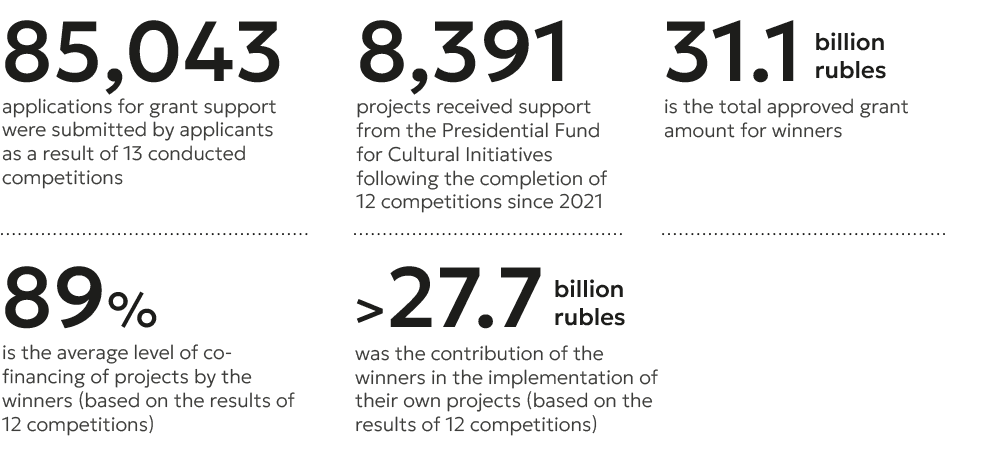
The share of applications not admitted to independent assessment decreased from 6% to 3% in the 2025 application campaign compared to the first grant campaign in 2021.
In 2023-2024, 20 regional project offices of the Presidential Fund for Cultural Initiatives were opened in the constituent entities of the Russian Federation. These offices provide informational and consultative support to potential grant recipients. By the end of 2024, new branches of the fund are planned to be launched in Khabarovsk, Donetsk, and Saratov.87
Results of the first grant competition by the Presidential fund for cultural initiatives in 2024
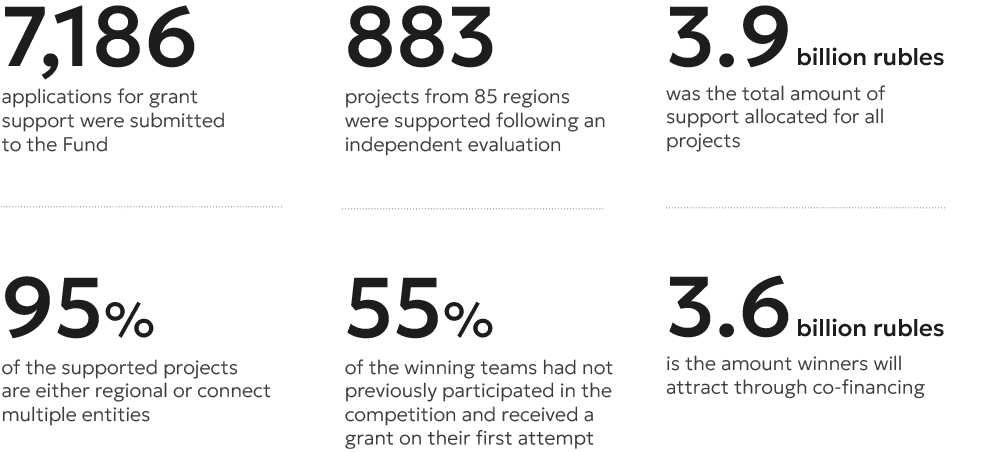
Results of the second grant competition by the Presidential fund for cultural initiatives in 2024
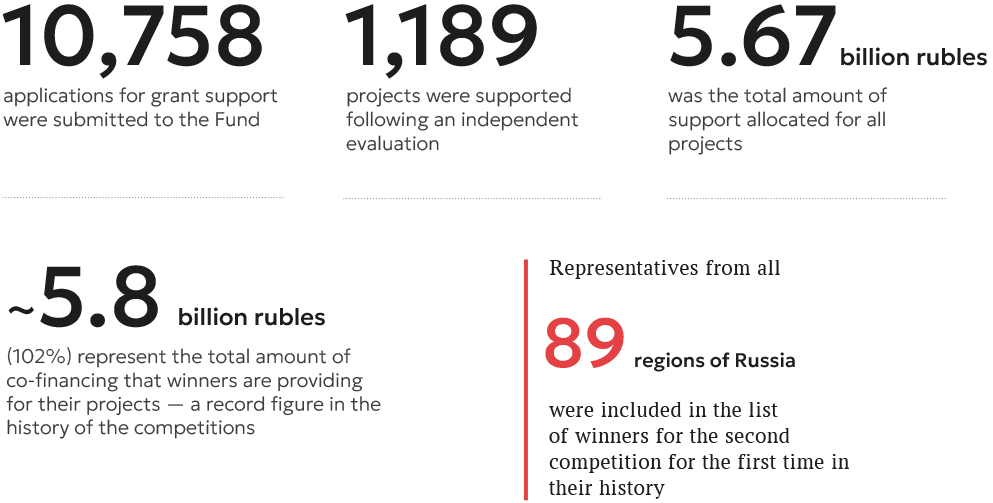
In addition to grant competitions, since 2023, in collaboration with partners, the Presidential Fund for Cultural Initiatives has been implementing a charitable program for targeted support to cultural and sports institutions in the Donetsk People’s Republic, Lugansk People’s Republic, Zaporozhye and Kherson regions. During this period, assistance has been provided to 2,118 cultural and sports institutions in the specified regions. The volume of charitable assistance amounted to 2.5 billion rubles.
Thanks to a decision by the President of the Russian Federation, cultural and sports institutions in the new regions were able to restart their operations, update their infrastructure and basic resources. As a result of the program’s implementation, a unique mechanism was also created for collecting the needs of beneficiaries from the new regions, assessing and monitoring the expenditure of funds. This includes an online system, aggregator operators on the ground, and a corps of expert consultants for direct interaction with cultural and sports institutions in need of assistance, their branches, and subdivisions.
Results of the first stage of the Presidential fund for Cultural Initiatives Charitable Program for targeted support of cultural and sports institutions in new regions
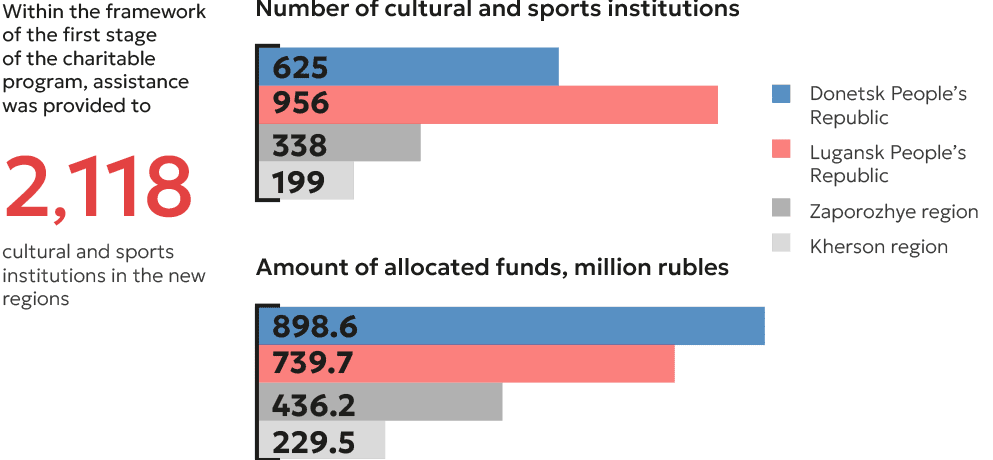
In October 2024, a decision was made to allocate funds for the continuation of the targeted support program. Applications for participation in the second phase were submitted by 1,417 cultural and sports institutions. The total amount of funds allocated in 2024 will amount to 2.5 billion rubles. They will be directed towards the purchase of modern sound, lighting, and interactive equipment, musical instruments, furniture, computer equipment, sports equipment and inventory, uniforms, conducting repair work at cultural and sports facilities, and installing new sports facilities.88
Experts from the Civic Chamber of Russia note that over three years of operation, the Presidential Fund for Cultural Initiatives has become an effective institutional mechanism for discovering and supporting talents in the regions, and receiving grant support from the Fund has become a recognized mark of quality for the projects implemented.
Another large-scale development institution in the field of supporting creative industries in our country over recent years has been the Internet Development Institute (IRI).
In 2015, with the support of the Presidential Administration, the founders of the public organization became the Russian Association for Electronic Communications (RAEC), the Internet Initiatives Development Fund (IIDF), the Regional Public Organization “Center for Internet Technologies” (ROCIT), and the Media and Communications Union. The organization’s goals focused on regulating relationships between the internet industry and government representatives.
Significant changes in the scale and types of activities of the Internet Development Institute have occurred since 2019. Following a directive from the President of Russia, after a meeting of the Presidential Council on the implementation of state policy in the field of family and children’s protection, the Government of the Russian Federation was instructed to identify a nonprofit organization to create a “coordination center for the organization of content production aimed at the spiritual and moral education of youth, and its dissemination on the Internet.”89 The Federal Agency for Youth Affairs (Rosmolodezh) proposed appointing the Internet Development Institute (IRI) as the coordination center responsible for organizing the production of socially significant content for youth. The proposal was accepted by the President of Russia,90 and in early 2020, the Internet Development Institute became the key operator of a competition to create internet content for Russian youth. When it came to making decisions about subsidizing online projects, the state drew from the successful experiences of the Cinema Fund and the Presidential Grants Fund, both of which have supervisory and expert councils that are responsible for the approval and validation of applications.
By February 2020, IRI received more than 1,200 applications for the first competitive selection, totaling nearly 25 billion rubles, which significantly exceeded the allocated annual subsidy of 3 billion rubles at that time.
In 2024, the Internet Development Institute showcased over 80 supported projects that have already been released or are preparing for release in 2024–2025.
Apart from projects in the blogosphere, these include numerous series based on real historical events and figures who influenced the development of our country, series set in contemporary Russia, children’s, youth, and multi-format educational and entertainment content, as well as several documentary films aimed at a broad audience.
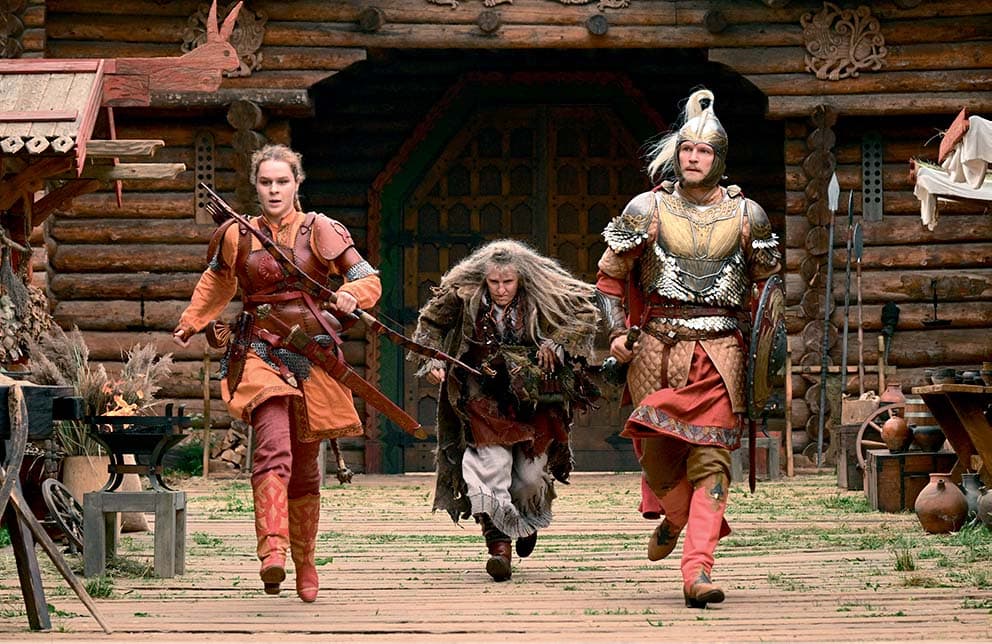
Filming of the series “The Last Warrior: Legacy,” directed by Anton Maslov. The project was realized with the support of the Internet Development Institute. July 11, 2023. Alexey Filippov / RIA Novosti.
In March 2024, the IRI and the distribution company “Media-Telecom” launched the educational and entertainment channel “We”, which broadcasts in the packages of over 40 major operators and is available on major OTT platforms: Wink.ru, KION, Okko, Kinopoisk. The TV channel introduced viewers to more than 168 titles of original content, comprising 595 premiere hours or 1,411 episodes.
The viewer success and high professional evaluation of the projects supported by the Internet Development Institute confirm the success of the state-adopted model, where the state does not commission orders but co-finances creative projects through expert assessment. This financial support often provides the additional impetus necessary for creative teams to successfully implement their ideas.
Internet development institute
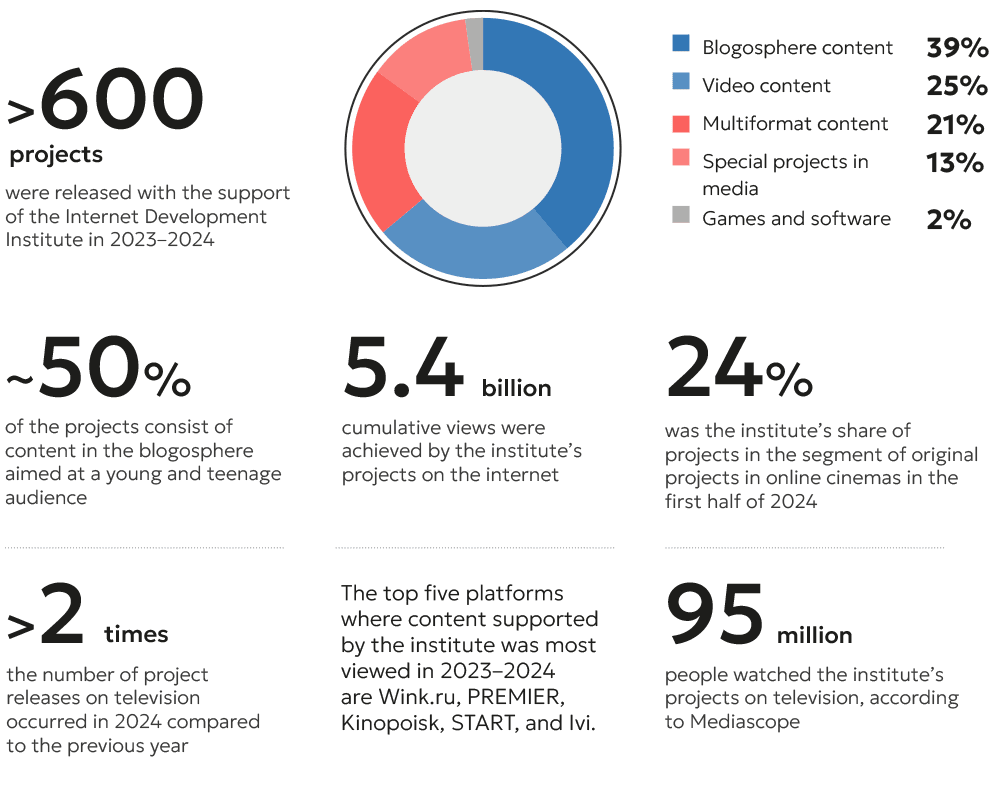
Since 2022, projects supported by the institute have received91
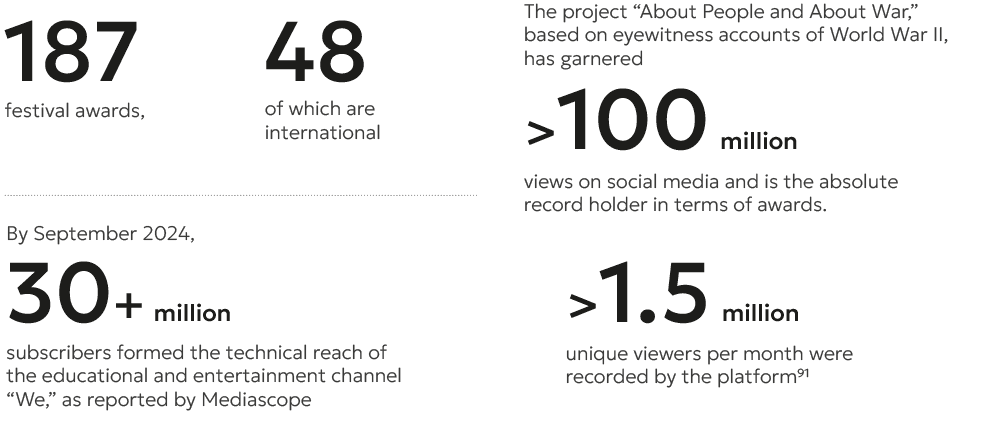
Social partnership in solving public tasks
As a result of the constitutional reform of 2020, social partnership became one of the constitutional principles. The inclusion of this term in the country’s Basic Law reflects the emerging demand in Russian society for active cooperation among the state, commercial organizations, and NPOs in addressing the most pressing social issues.
The “Circle of Kindness” Foundation, established in 2021 with the active participation of the Civic Chamber of Russia, has become an example of a unique model of social partnership that has completely transformed the system of aid for children with severe and rare diseases. The Foundation’s funding is sourced through a mechanism of a “colored” targeted social tax, with deductions from the increased personal income tax rate of 13% to 15%. This approach allows for direct participation in its financing by the state, business, and society.
Thanks to the four-year work of the Foundation, Russia today has become one of the world leaders in providing therapy for children with severe and rare diseases. Whenever a new drug for an orphan disease with proven effectiveness and safety becomes available in the world, it can also be made accessible to Russian children.
In October 2024, the Center for Civil Society and Nonprofit Sector Research at the HSE University conducted a sociological survey titled “Perception of the ‘Circle of Kindness’ Foundation and Other State Institutions.” According to the survey results, among citizens informed about the Foundation’s activities, 85% of respondents trust the “Circle of Kindness.” The Foundation boasts one of the highest recognition and trust levels among institutions for the protection of citizens’ rights and the development of civil society.
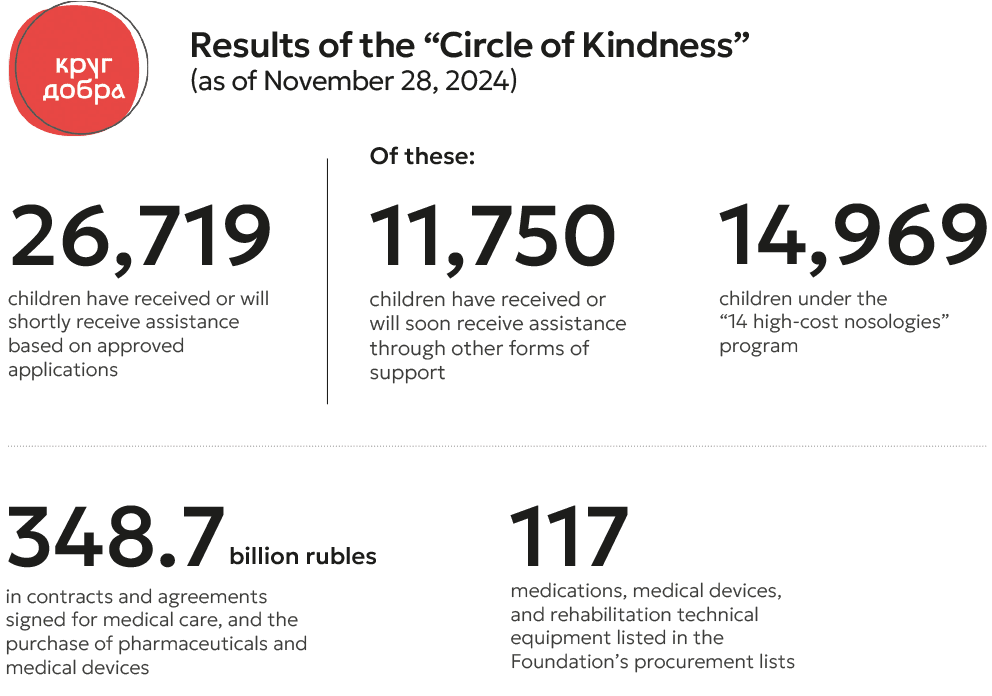
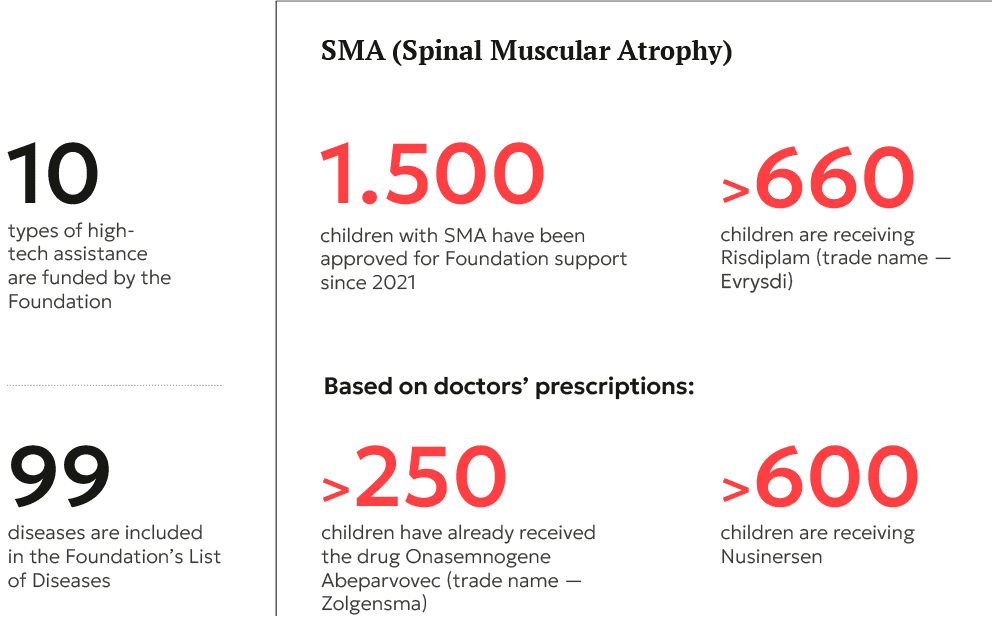
Before the creation of the “Circle of Kindness” Foundation, not all regions could provide therapy for children with certain severe and rare diseases. Even though medications existed for these conditions, they were extremely expensive and generally not included in the State Program of Guaranteed Free Medical Assistance. As a result, charitable donations could only help a few individuals. The Foundation took on the responsibility of providing treatment for children, allowing nonprofit organizations, patient communities, and charitable foundations to redirect resources and efforts to other necessary activities to help sick children, such as targeted assistance, rehabilitation support, specialist training, and more.
In 2023, by decision of the President of Russia, the Foundation received the right to support its wards until they reach the age of 19, to give regions the opportunity for a smoother transition of the Foundation’s wards into the adult healthcare system.
From 2023, in accordance with a previously adopted Presidential Decree of the Russian Federation and amendments to Federal Law 323-FZ, the “Circle of Kindness” Foundation became the source of funds for purchasing 39 types of medications for children from the state program “14 high-cost nosologies.”
The availability of therapy through the Foundation stimulated the development of diagnostic programs. In 2023, an expanded neonatal screening program was launched, increasing the number of diseases in the screening program from 5 to 36 hereditary diseases and their groups. During 2023, 98% of newborns in the Russian Federation were examined as part of the expanded neonatal screening. For 633 children, a diagnosis of congenital and/or hereditary disease was confirmed: 103 children were diagnosed with spinal muscular atrophy (SMA), 175 children with primary immunodeficiency, and 355 children with hereditary metabolic disorders.
Thanks to the “Circle of Kindness” Foundation, children with Duchenne muscular dystrophy (DMD) now have access to several expensive pathogenic therapy drugs for this severe life-threatening condition that are not yet registered in Russia. More than 450 Russian children are currently receiving these medications funded by the Foundation. As of June 2024, Russia became one of the first countries where Delandistrogene Moxeparvovec (trade name — Elevidys) became available. This is the first drug in the world for single administration that is not just pathogenic, but specifically a gene-replacement therapy for Duchenne muscular dystrophy (DMD) that requires just a single administration. By the end of 2024, several dozen children will receive it. This drug is considered one of the most expensive in the world.
Establishing the most efficient collaboration between the Foundation and regions is a priority for “Circle of Kindness.” In 2023, cooperation agreements were signed with 24 regions. At the end of 2023, submitting applications directly to the Foundation became available through the Unified State Health Information System for health authorities in the Lugansk and Donetsk People’s Republics. In early 2024, a mechanism was launched to assist children with severe and rare diseases from Kherson and Zaporozhye regions. Previously, aid to children from these new Federation subjects was provided through other regions of Russia.
The “Circle of Kindness” Foundation operates within the segment of the Unified State Health Information System, integrated with the Unified Portal of Public Services. This allows for a unified digital process:
-
Parents can apply for Foundation assistance on the Public Services portal;
-
Health authorities of the Federation subjects, expert council members, and the Foundation work with applications in a digital environment;
-
Health authorities, the Foundation, suppliers, and recipients exchange electronic documents;
-
Monitoring processes in the “Knowledge Base” allows for overseeing operations, quickly addressing issues, and responding to parents’ inquiries/requests;
-
All inquiries and requests received through any feedback channel are logged, analyzed, and used to identify and resolve issues.
It’s also noteworthy that thanks to the support of the Federal Antimonopoly Service in negotiations with pharmaceutical manufacturers, the Foundation achieved a significant reduction in the drug prices, averaging a 40% discount from the offered price and 49% from prices in purchases conducted before the Foundation’s establishment.
At the start of 2024, the “Circle of Kindness” Foundation saved 12.5 billion rubles by reducing drug costs. The saved funds are also allocated for providing medicines to children.
The Foundation operates openly and transparently, reporting publicly on its activities annually through annual reports. In mid-2024, auditors from the Accounts Chamber reviewed the prudent use of the “people’s budget.”92
Prudence in the use of the “people’s budget” was verified by auditors from the Accounts Chamber in mid-2024, confirming at the end of their inspection the absence of any misallocation of funds. Successfully developing and scaling its activities, the “Circle of Kindness” Foundation demonstrated with its own example the potential of developing social partnership practices as an effective mechanism for solving key issues of social development.
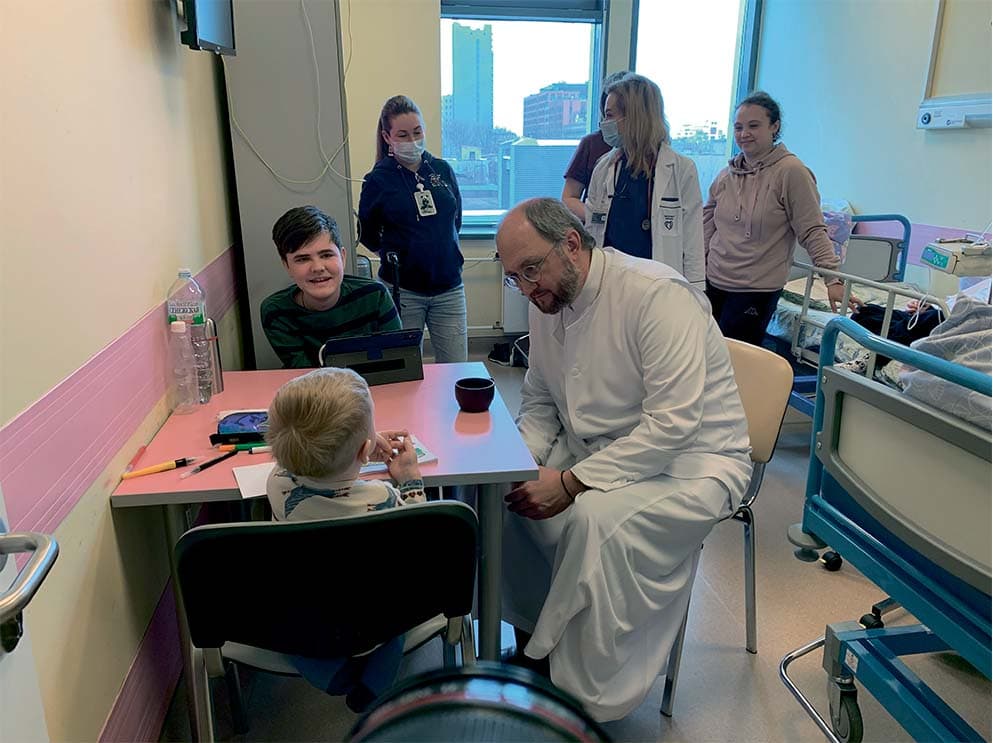
Meeting of the leadership with its wards at the Morozovskaya Children’s City Clinical Hospital State Autonomous Healthcare Institution of Moscow’s Department of Health (GBOU “Morozovskaya DGB DZHM”). April 18, 2024. “Circle of Kindness” Foundation.
One of the most important topics in developing the mechanism of social partnership in the healthcare sector is the collaboration between government bodies and specialized public and patient organizations.
Patient organizations, the first of which appeared in Russia about 30 years ago to protect the rights and interests of patients under the care of foundations, are now involved in a wide range of issues: from providing informational, educational, and expert support to patients and doctors to establishing a direct and continuous dialog with authorities to improve medical care, ensure the necessary quality of medical services, and access to modern drug therapy.
The establishment of the All-Russian Union of Patients in 2010 marked a new stage in the development of this movement—the public organization started to perform coordinating and unifying functions for the patient community throughout the country.
The All-Russian Union of Patients unites 17 national and interregional organizations and over 80 of their branches: regional NPOs representing the interests of patients of more than 5 million citizens of the Russian Federation—patients with severe debilitating diseases.93
The Civic Chamber of the Russian Federation, acknowledging the high social significance and effectiveness of patient organizations, serves as a constant expert platform for conducting thematic events of patient communities. These events ensure a multilateral dialog among all interested parties on the development of the healthcare system in Russia and the improvement of service quality.
One example of such interaction in 2024 is the collaboration with the Cancer Patients Association “Hello”. This collaboration included a series of joint events at the Civic Chamber’s venue, including thematic roundtables dedicated to the issues and prospects of developing rehabilitation programs, protecting children and adults from vaccine-preventable diseases,94 as well as the large-scale annual All-Russian Cancer Patients Congress. This congress focused on the development of the oncology service and enhancing the accessibility and quality of oncology care across the Russian Federation.95
Another example of such constructive cooperation is the partnership with the All-Russian Society of Oncohematology “Support”. In 2024, the Civic Chamber, together with the public organization, held the 19th All-Russian Forum for Patients with Oncohematological Diseases “New Horizons - 2024”. At the forum, experts, patient and medical community representatives, and executive and legislative authorities discussed the accessibility and quality of medical care, the interaction of medical and patient communities, the functioning of public councils at federal and regional levels in healthcare, the organization of a public oversight system, and current legal regulation issues in healthcare.
For more than 10 years, the Civic Chamber of Russia has been a platform for uniting the efforts of the state, public, and patient organizations in addressing the development of blood donation and its components. To this end, a Coordinating Council for Blood Donation was established at the Russian Civic Chamber, with the participation of the National Health Development Fund. This council unites representatives of healthcare science and practice, regional authorities, public institutions, initiative groups, and nonprofit organizations working in the promotion and development of unpaid blood donation and its components.
Since 2022, national donor campaigns have been conducted annually with the participation of the Coordinating Council, covering more than 60 regions of the Russian Federation and bringing together thousands of people of different ages.
In February 2024, the National Health Development Fund, in association with the Coordinating Council at the Civic Chamber of the Russian Federation on Blood and Bone Marrow Donation, the Federal Medical-Biological Agency, and the All-Russian public organization “Russian Red Cross,” launched the third national campaign “Donor Family Code.” In 2024, it was dedicated to the Year of the Family, as announced by the President of Russia.
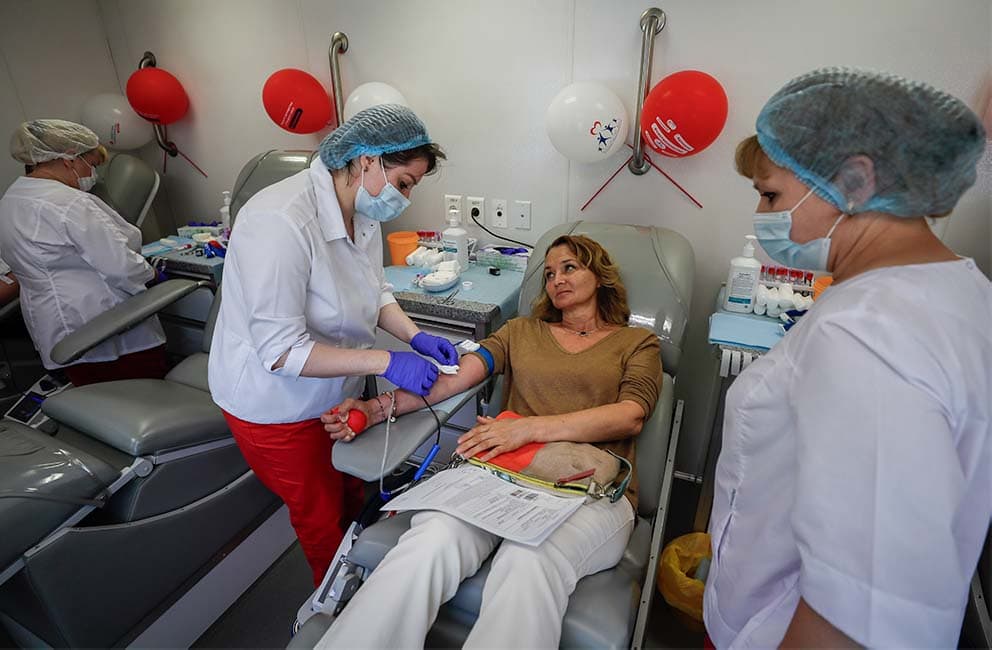
Donor Day at VDNH as part of the All-Russian Action “Donor Family Code”. July 23, 2024. Yuri Kochetkov / TASS
All-Russian Action-contest “Donor Family Code”
Duration of the Action
February — November 2024
Activities
Educational online conferences, seminars, and other formats aimed at the systematic development of blood and bone marrow donation.
Participants
Blood service institutions, government representatives, organizations promoting corporate blood donation, nonprofit organizations, foundations, and individual participants carry out various activities across Russian regions aimed at involving families in donation, promoting donation among youth, and developing donation as a family tradition.
Outcomes
During the action’s implementation period, 5.7 thousand events were held, with over 436 thousand participants from 69 regions of Russia, as well as from Kazakhstan. More than 220 thousand people donated blood, and over 45 thousand people joined the Federal Bone Marrow Donor Registry.
Successful practices in healthcare have shown that a significant result of implementing the social partnership model is not only an increase in trust in the healthcare system as a whole but also an enhancement of its transparency and openness to society. Informed citizens and patients become full participants in the process of improving and developing the healthcare system, which undoubtedly impacts its effectiveness.
Today, numerous vivid and interesting projects are being implemented across the regions of the Russian Federation within the framework of social partnership, aimed at addressing pressing social issues. Selected projects can be found in the Special Report of the Civic Chamber of the Russian Federation “Social Partnership in Modern Russian Society,” which initiates a discussion at the Civic Chamber platform about the very concept of “social partnership,” the role of nonprofit organizations in society, and the development of a new relationship system in the social sphere.
- 2024: The Main Topics in Russian Civil Society
- Civil Society and the State
- Institutions of civil society as catalysts for social change
- Collaboration and cooperation between society and the state
- Consolidated efforts of public institutions to support Special Military Operation veterans
- Public participation in achieving national development goals
- 2024 — the Year of the Family
- Nonprofit organizations: a means for partnership between the state and society
- Interaction of the institution of commissioners in the Russian Federation with civil society
- Social investments as a state contribution to developing the civic potential of the nation
- Institutions of civil society as catalysts for social change
- Citizen Observation
- Public Oversight
- Citizen Appeals
- Public Diplomacy
- Conclusion. Public Initiatives for a New Era
Social investments as a state contribution to developing the civic potential of the nation